
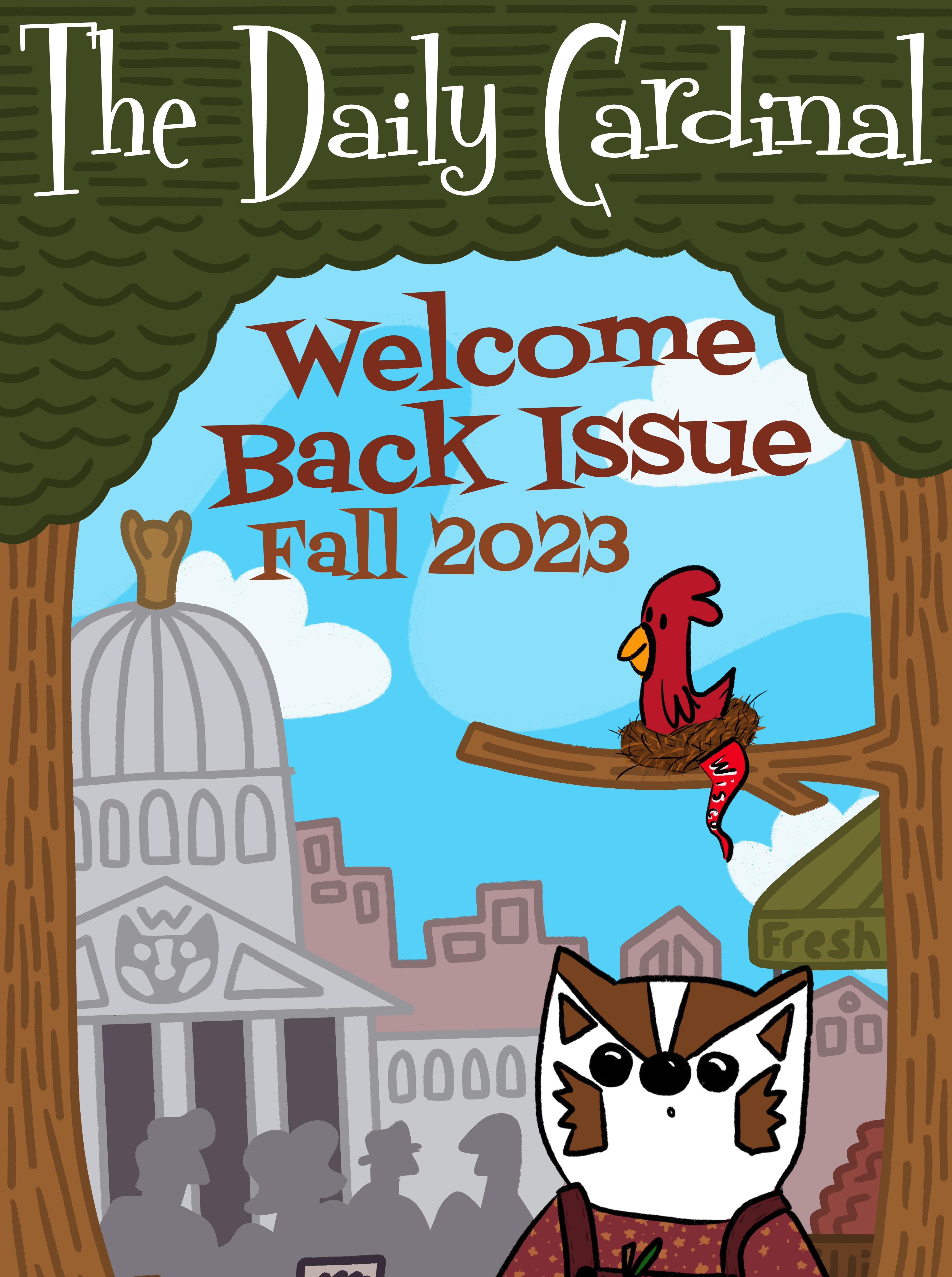
“…the great state University of Wisconsin should ever encourage that continual and fearless sifting and winnowing by which alone the truth can be found.” University of Wisconsin-Madison Since 1892 dailycardinal.com Welcome Back Issue 2023 l HENRY MOORE & ZOE KUKLA/THE DAILY CARDINAL
the University of WisconsinMadison and its surrounding community with a circulation of 10,000.
Capital Newspapers, Inc. is the Cardinal’s printer. The Daily Cardinal is printed on recycled paper. The Cardinal is a member of the Associated Collegiate Press and the Wisconsin Newspaper Association. All copy, photographs and graphics appearing in The Daily Cardinal are the sole property of the Cardinal and may not be reproduced without written permission of the editor in chief.
The Daily Cardinal accepts advertising representing a wide range of views. This acceptance does not imply agreement with the views expressed. The Cardinal reserves the right to reject advertisements judged offensive based on imagery, wording or both.

Complaints: News and editorial complaints should be presented to the editor in chief. Business and advertising complaints should be presented to the business manager.
Letters Policy: Letters must be word processed and must include contact information. No anonymous letters will be printed. All letters to the editor will be printed at the discretion of The Daily Cardinal. Letters may be sent to opinion@ dailycardinal.com.
Editorial Board
Graham Brown • Tyler Katzenberger
• Charlotte Relac •
• Em-J Krigsman
Priyanka Vasavan • Drake White-Bergey • Ethan Wollins
Board of Directors
Scott Girard, President • Ishita
Chakraborty • Don Miner • Nancy Sandy
• Nathan Kalmoe • Josh
• Phil Hands
Klemons • Barbara Arnold • Jennifer Sereno
Consider the Cardinal during your college experience
By Drake White-Bergey EDITOR-IN-CHIEF
Crafting a resume, creating a portfolio, networking and building connections, and learning communication skills — you’ll quickly learn that these are all essential parts of beginning your professional career during your time at the University of Wisconsin-Madison.
Luckily, you can do all of these and more at The Daily Cardinal.
The Cardinal provides its reporters with a variety of real-world experiences they can’t find anywhere else.
On Badger gamedays, Cardinal reporters take to the press boxes, field and floor at Camp Randall Stadium, the Kohl Center and the Wisconsin Field House to do first-hand coverage of all Wisconsin athletics teams.
In the evenings, Cardinal reporters head to the Sylvee, High Noon Saloon and Majestic Theater to listen to their favorite touring and local artists perform.
During the day, Cardinal reporters
head to the Wisconsin State Capitol building to get one-on-one interviews with legislators and state politicians, including Gov. Tony Evers.
On special occasions, Cardinal reporters travel across the state to report on visits from President Joe Biden, Vice President Kamala Harris, First Lady Jill Biden and other highprofile political figures as they travel to the key swing state of Wisconsin.
At a moment’s notice, Cardinal reporters are on the ground reporting on breaking news as it happens — whether it be the collapse of the Memorial Union pier, gunshots fired on State Street or protests against university administration.
But what matters most to the Cardinal is our community. The Cardinal prides itself in its history of delving deep into the issues that plague UW-Madison students, showcasing the efforts of local businesses and organizations, and holding those in power accountable for their actions.
What matters most isn’t the voice
of those in power. It’s the voice of our collective community. And that’s what we highlight at the Cardinal.
The Cardinal has been an integral part of the UW-Madison community for over 130 years, providing community-oriented coverage that matters. In fact, the Cardinal has generations of living alumni across the entire world who dedicated their time to highlighting the efforts of the UW-Madison community during their time in college.
Over 20 Cardinal alumni have gone on to win the famed Pulitzer Prize, and others have gone on to become high-profile journalists in their respective fields. Big Ten basketball reporter Andy Katz, Pulitzer Prize-winning journalist Anthony Shadid, former Madison Mayor Paul Soglin and The Onion co-founder Scott Dikkers all wrote for the Cardinal during their time at UW-Madison.
Currently, the Cardinal holds the two highest awards for student journalism in Wisconsin — the
Wisconsin Newspaper Association’s General Excellence award and the Society of Professional Journalists’ Mark of Excellence award — something no other student paper in Wisconsin can claim.
Cardinal editors work hand-inhand with our writers to produce the best journalism at UW-Madison. Whether a writer is a seasoned journalist or has never written an article before, the Cardinal’s editors work carefully and diligently to train our reporters to be the best they can be.
News-writing and communication are invaluable skills, and the Cardinal can teach them to you. Whether you’re looking for a career in journalism, communications, marketing, public relations, publishing, screenwriting or none of the above, the skills you learn at the Cardinal will serve you throughout your career.
If you’re considering what to do with your time at UW-Madison, consider joining The Daily Cardinal.
Three UW-Madison news stories to watch this fall
By Tyler Katzenberger MANAGING EDITOR
Protests. Pier collapses. New housing developments. And a tumultuous state budget season that left UW campuses tightening their belts.
It’s been a busy summer at the University of WisconsinMadison, and plenty of stories behind recent headlines will continue to impact campus throughout the upcoming semester.
Here are three news stories The Daily Cardinal is watching this fall:
How will UW-Madison absorb millions in budget cuts?
UW-Madison is facing a $7 million budget cut this year, the most of any UW campus.

It’s still unclear how UW-Madison will absorb budget cuts, though other universities already announced furloughs and layoffs.
Gov. Tony Evers, a Democrat, proposed a $305 million budget increase for the UW System in his initial two-year state budget plan earlier this year.
from UW officials to spend the money on workforce development programs.
Rep. Mark Born, R-Beaver Dam, who co-chairs the budget-writing committee, told the Cardinal he is open to hearing the UW System’s plan.
But Vos has said the UW System won’t get more money until it cuts DEI programs, something the university opposes.
The Board of Regents will see a draft of the plan in October that will focus on engineering, data, science and nursing programs, according to the Milwaukee Journal Sentinel.
Can UW leaders balance free speech and belonging?
Republican lawmakers have attacked the UW System for years for what they see as suppression of conservative speech on college campuses.
UW System leaders in response have placed free speech at the forefront of campus messaging and conducted a student free speech survey last academic year.
Campus administrators, including Chancellor Jennifer Mnookin, have met with Black student leaders since the protests to discuss concerns about long-standing racial bias and discrimination at UW-Madison.
city nationwide — driven in part by on- and off-campus housing shortages.
© 2023, The Daily Cardinal Media Corporation
ISSN 0011-5398
Republicans instead cut $32 million from the UW System budget and demanded campuses eliminate all Diversity, Equity and Inclusion (DEI) programs. Assembly Speaker Robin Vos, R-Rochester, said the programs promoted indoctrination and were a waste of taxpayer money.
UW campuses could regain the $32 million lost to budget cuts later this year if the Legislature’s Republicancontrolled budget-writing committee approves a plan
Still, some student leaders say recent pushes to expand free expression empower acts of hate speech that jeopardize their sense of belonging and safety on campus.
UW-Madison last year saw antisemitic chalkings on the first day of classes, a protest over a transphobic, conservative speaker invited to Memorial Union and days of protests after video footage of a white UW-Madison student making violent racist remarks about Black people circulated on social media.
But Mnookin — who told student reporters last fall that “one person’s hate speech is another person’s idea” — maintains legal protections for free speech limit the university’s response to hate and bias incidents.
Will campus housing costs keep climbing amid shortages?
Last year’s scramble for student housing made headlines after some students braved cold fall air and waited in line for hours to get an apartment amid skyrocketing housing costs.
Average rents in Madison rose nearly 30% since March 2020 — faster than any other
Long lines and rent hikes are likely to happen this year, too. While UW-Madison said its current freshman class is slightly smaller than last year’s record-setting number of new freshmen, most of the roughly 8,000 students accepted this fall will join upperclassmen searching for housing later this fall.
Neighborhoods around campus are in the midst of a luxury student high-rise boom to address the housing shortage, with over a half-dozen such projects under construction or in planning and more likely on the way.
Still, affordable student housing advocates worry the luxury high-rise boom is slashing the number of low-cost units available to students, forcing those with lower incomes to accept poor housing conditions or move further away from campus.
2 Welcome Back Issue 2023 news
Corrections or clarifications? Call The Daily Cardinal office at 608-262-8000 or send an email to edit@dailycardinal.com. For the record l An independent student newspaper, serving the University of Wisconsin-Madison community since 1892 Volume 133, Issue 4 2142 Vilas Communication Hall 821 University Avenue Madison, Wis., 53706-1497 (608) 262-8000 News and Editorial edit@dailycardinal.com News Team News Manager Ella Gorodetzky Campus Editor Liam Beran College Editor Cormac LaLiberte City Editor Francesca Pica State Editor Ava Menkes Associate News Editor Jasper Bernstein Features Editor Ellie Bourdo Opinion Editors Graham Brown • Charlotte Relac Arts Editors Noah Fellinger • Gabriella Hartlaub Sports Editors Maddie Sacks • Seth Kruger Special Pages Editor Annika Bereny Photo Editor Lauren Aguila • Meghan Spirito Graphics Editors Henry Moore • Zoe Kukla Science Editor Madelyn Anderson Life & Style Editors Hina Suzuki • Erin Mercuri Podcast Director Honor Durham Copy Chiefs Noe Goldhaber • Maddie Gamburg Copy Editors Jack Ecke • Ella Gorodetzky • Kodie Engst Social Media Manager Rachel Schultz Business and Advertising business@dailycardinal.com Business Manager Emily Chin • Kelly Gieryn Advertising Manager Christian McKenna Marketing Director Claire Taylor The Daily Cardinal is a nonprofit organization run by its staff members and elected editors. It receives no funds from the university. Operating revenue is generated from advertising and subscription sales. The Daily Cardinal is published weekdays and distributed at
dailycardinal.com
Editor-in-Chief Drake White-Bergey Managing Editor Tyler Katzenberger
The Daily Cardinal provides invaluable experiences for its reporters, setting up lifelong connections and giving reporters valuable career skills.
BRYCE RITCHER/COURTESY OF UW-MADISON
Two more UW schools look to address deficits with UW System $33 million in the red UW leaders seek ‘positive’ partnership with Blk Pwr Coalition
By Jasper Bernstein ASSOCIATES NEWS EDITOR
The Blk Pwr Coalition has met on multiple occasions with University of WisconsinMadison Chancellor Jennifer Mnookin’s office, Vice Chancellor for Student Affairs Lori Reesor told The Daily Cardinal on Tuesday.

Students from the Blk Pwr Coalition first met on May 10 with Mnookin, interim Provost Eric Wilcots, Deputy Vice Chancellor LaVar Charleston and Reesor, the week after widespread protests over a racist video.
The group met with university leaders multiple times over the summer, most recently for a “touch-base” meeting the week before fall classes began, according to Reesor.
Reesor called the meetings “incredibly positive” and said university leaders are exploring future partnership opportunities.
“I have great respect for the leadership in the organization and some of [their] shared activities and plans,” Reesor said. “[We’re] starting to partner and think about opportunities to engage the campus
from the horrific video that happened last semester.”
Mnookin attended the first meeting in May but did not attend follow-up meetings with senior university administrators in the past few months, Reesor confirmed.
The meetings come months after a video showing Audrey Godlewski, a white UW-Madison student, saying racial slurs and violent remarks directed toward Black people. The video was met with immediate criticism from students, community members and university officials, sparking days of student-led protests led by the newly-formed Blk Pwr Coalition.

Godlewski apologized for the video a month later in an email sent to the Cardinal.
In a response after Godlewski’s apology was made public, the Blk Pwr Coalition explained their disappointment on her choice “to release her apology to campus media before consulting with the people whom her comments directly impacted.”
The Blk Pwr Coalition did not respond to a request for comment.
By Anna Kleiber STAFF WRITER
University of Wisconsin System campuses are scrambling to address significant budget deficits after Republican state lawmakers cut $32 million in UW System funding despite a record-high state budget surplus of nearly $7 billion.
UW-Platteville and UW-Parkside announced on Aug. 21 that both campuses will consider furloughs, retirement incentives and budget cuts to close their combined $15 million deficit.
The announcements came less than a month since UW-Oshkosh announced plans to cut 200 staff positions and require employee furloughs.
At an Aug. 22 UW System Board of Regents meeting, UW System President Jay Rothman pointed to the disparity between taxpayer support for technical colleges and the university system, inflationary changes, a decade-long tuition freeze and declining enrollment as key determinants for “a financial situation that has been 10 years in the making.”
The $32 million cut in UW System funding stems from state Republican lawmakers’ attacks on diversity, equity and inclusion (DEI) programs that take place across all 13 UW System campuses.
Assembly Speaker Robin Vos, R-Rochester, estimated DEI programs would cost $32 million over the next two years and proposed the same amount be eliminated from the UW System’s budget. Vos has been a vocal opponent of DEI programs, calling them the left’s “new religion” at a state party convention in June, according to the Milwaukee Journal Sentinel.
UW System campuses can get that funding back if they eliminate their DEI programs and focus on programs for workforce development.
Rothman expressed doubt that the UW System “can plan for [the $15.9 million] because we have to operate within the means we have.” The UW System plans to present a workforce development proposal for Regents approval at an October meeting, he added.
The Board of Regents voted earlier this year to increase in-state undergraduate tuition systemwide by about 5%, the first increase since a 2013 tuition freeze. Most UW campuses hope to use that revenue to help offset their deficits, according to the Journal Sentinel.
Will UW System budget cuts affect UW–Madison?
Only two UW universities ended the 2023 fiscal year without a deficit: UW-Madison and UW-La Crosse.
But UW-Madison won’t be spared from cuts, despite ending the year in the green.
UW-Madison has the largest surplus among the 13 system campuses, 10 of which are running deficits. It will bear the brunt of those deficits, absorbing 44% — or $7 million — of this year’s $16 million cut despite not having a deficit of its own, according to the Milwaukee Journal Sentinel.
The Legislature’s budget-writing committee also cut biennium budget funding for a new UW-Madison engineering building, a move
decried by UW-Madison officials and state Democratic legislators.
These are the two biggest areas of concern for UW-Madison, District 8 Alder MGR Govindarajan told The Daily Cardinal on Aug. 23.
Though he doesn’t believe UW-Madison students will lose DEI positions, the campusarea alder and UW-Madison senior said creating new ones “might be harder.”
Even without state funding, Govindarajan expects the university will keep its DEI positions. It will presumably have to find other sources of funding to do so, something he expects will occur.
Sean Nelson, UW System vice president for finance and administration, explained revenue diversity’s importance for UW-Madison during the Aug. 22 meeting.
UW-Madison’s portfolio is “starkly different than non-Madison campuses,” Nelson said. Philanthropy is one critical example. UW-Madison’s support from “gifts, grants and contracts” comprises 33% of its 2023 revenue budget, compared to just 4.9% for non-Madison campuses. Nelson added that UW-Madison’s outside investment goes to a degree “other campuses just don’t have the capacity to do.”
That’s a crucial factor in the overall composition of their yearly budgets.
“When you look at the non-Madison campuses, tuition and GPR [general purpose revenue] make up over 50% of the total revenue, so they’re much more reliant on tuition and GPR,” Nelson said.
For UW-Madison, though, that number is about 30%.
As the universities explore methods to remediate their deficits, Democratic state lawmakers broadly criticized the cuts to UW System funding and argued the cuts will hurt Wisconsin in the long run.
“The UW System is Wisconsin’s economic engine and our best tool for attracting and retaining the next generation of workers,” state Sen. Kelda Roys, D-Madison, said in an Aug. 21 statement. “Every chance they get, Republicans choose tax giveaways for the ultra-wealthy instead of investing in core public institutions, our workforce and our economy.”
For Assembly Rep. Lori Palmeri, D-Oshkosh, who spoke with the Cardinal on Aug. 25, the backlash around DEI and the $32 million cut is personal. As a UW-Oshkosh alum and someone who worked at a local level to create a DEI committee within the Oshkosh community, Palmeri stressed the importance of DEI programs within the state.
DEI positions are important for creating inclusive and welcoming environments on campus and within communities, Palmeri explained. She said it’s “shameful” that Republican lawmakers on the Legislature’s budget-writing committee killed the $300 million UW System funding increase Gov. Tony Evers requested in favor of a $32 million cut.
“I am confident we are going to get through this storm,” Palmeri said. “ It’s just very painful at the moment.”
DRAKE WHITE-BERGEY/THE DAILY CARDINAL ALTHEA DOTZOUR/UW-MADISON news dailycardinal.com Welcome Back Issue 2023 l 3
Chancellor Jennifer Mnookin accepts an envelope containing a list of demands regarding the University of WisconsinMadison’s response to a video which shows a white UW-Madison student using racial slurs on May 3, 2023.
The Blk Pwr Coalition has met with Chancellor Mnookin’s office multipletimessinceMay.
How the GOP’s clash with the UW System created ‘something of a mystery’
UnclearanswersregardingDEIoffices,freespeechdebacles andfiscalsquabblesmarkaneweraforWisconsinuniversities.
By Ava Menkes & Liam Beran
STATE NEWS EDITOR AND CAMPUS NEWS EDITOR
A controversial free speech survey. Threats to hundreds of diversity positions. And millions of dollars cut from an alreadystrained university budget.
The University of Wisconsin System braved a rollercoaster year of criticisms levied against its colleges, largely by Republican lawmakers in the state Legislature, in an effort to prevent a $32 million funding cut.
But two months after the next two-year state budget was signed — with UW System funding cuts included — it’s still unclear how UW campuses will address budget shortfalls.
For University of WisconsinLa Crosse Chancellor Joe Gow, it’s the latest chapter in a series of GOP attacks against public higer education, sending university leaders through hoops to run their campuses on shoestring budgets.
“This is the uncertainty,” Gow said. “We rely on a certain level of support from the state, and if that money is cut, that creates real problems.”
Gow, who retired on Aug. 31, has acclimated to the influence of the state legislature over his 17 years in the position.
His greatest challenge over those years was receiving state support from a Legislature that, in his eyes, has too much decision-making power, he told the Cardinal.
“I think if you did an opinion poll, and you asked the public, ‘do you think it’s a good idea for legislators to determine what is talked about on college campuses?’ Most people would say, ‘That’s not a good idea,’” Gow said.
That holds even with sympathetic officials in the executive branch.
Democratic Gov. Tony Evers called Gow to congratulate him shortly after his retirement announcement. Gow told the Cardinal that Evers “understands the importance of funding higher education” but “can’t do it alone.”
“I’m a little concerned about the direction that some people in the Legislature want to go,” Gow said.
Republican lawmakers in recent years haven’t been afraid to flex their powerful legislative majority.
Assembly Speaker Robin Vos, R-Rochester, abruptly suggested the elimination of diversity, equity and inclusion (DEI) offices in May, calling them “an institute of indoctrination.”
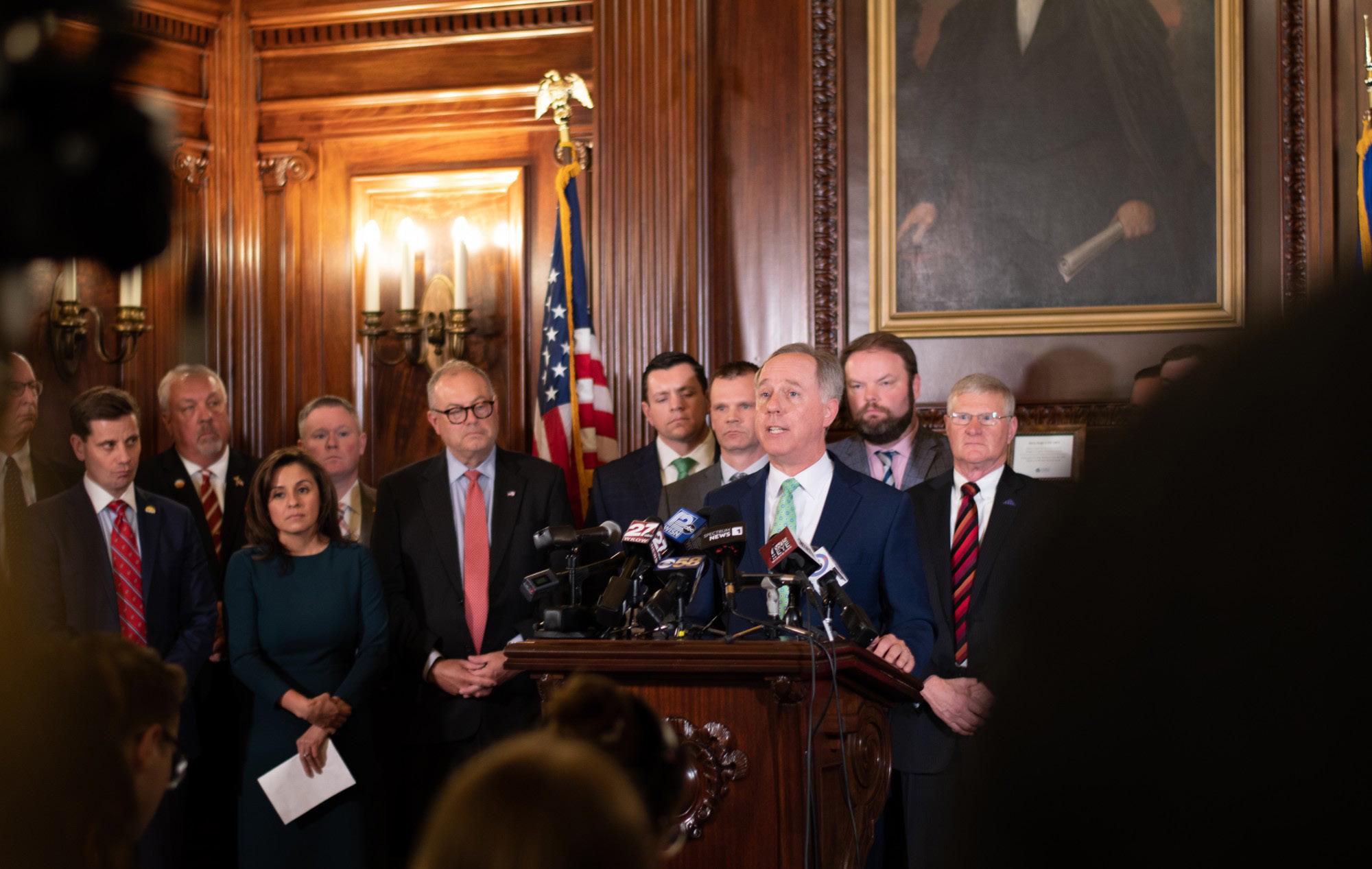
After the Legislature’s budget-writing committee approved a $32 million funding cut that initially included 188 DEI-related positions later restored by a partial veto from Gov. Tony Evers — the committee dangled a carrot in front of UW System schools in the form of an ultimatum to restore the $32 million in funding if campuses who request it agree to remove DEI offices and redirect funds toward workforce development initiatives.
Budget committee member Sen. Kelda Roys, D-Madison, told The Daily Cardinal UW-system campuses are forced to make “impossible choices” at the moment, which include furloughing staffers and raising costs for students.
UW System
President Jay Rothman has maintained that he holds unwavering support for DEI programs despite budget cuts. But less than a week after Vos pledged to remove DEI offices from UW schools, Rothman banned diversity statements from job applications at UW System schools.
Additionally, Rothman said at an Aug. 22 special UW Board of Regents meeting that recouping funding through a workforce development proposal is something the UW System cannot plan for. He said UW campuses across the state have had to adjust budgets and institute cost-cutting measures, including layoffs.
The Board of Regents approved a budget that marked 10 out of 13 campuses projected to be in a deficit by the end of the school year.
Nonetheless, UW-La Crosse remains one of the campuses that avoided a deficit. Gow told the Cardinal that between Vice Chancellor Bob Hetzel’s efforts to address finances and UW-La Crosse’s steady enrollment, the school has maintained an abovewater financial position.
And the present state of DEI offices remains a lingering question. The Cardinal contacted all 13 non-secondary UW System campuses and asked them if there have been any layoffs or current or planned changes to their DEI offices as a result of the legislative cut.
Of those campuses, most redirected to UW System Relations Director Mark Pitsch, and some did not respond to the initial inquiry. A representative for UW-Green Bay declined to comment on behalf of the university.
Pitsch provided the Cardinal an email statement outlining the university’s commitment to the workforce development proposal but gave no answer to repeated questions about layoffs at campus DEI offices.
Sen. Kelda Roys, D-Madison, sits on the budget-writing committee. She told The Daily Cardinal that UW System campuses are forced to make “impossible choices” at the moment that include furloughing staffers and raising costs for students.
DEI programs, Roys said, are necessary for universities — a key entry point for Wisconsin workers — to foster a welcoming environment. To remove those programs, which Roys noted are
also used at many large corporations, would be “functionally like abandoning their mission.”
Roys believes the UW System won’t cut DEI despite funding cuts and GOP opposition.
However, she said the budget cut is part of a decadeslong Republican “war on public higher education.”
“[DEI isn’t] something you’re going to throw away in the garbage because Robin Vos is holding you hostage,” she added.
Gow added that people misunderstand the purpose of DEI programs. To Gow, those programs exist to recruit, retain and support traditionally underrepresented students and assist in growing enrollment.
He struggled to find reason in the restoration effort that might allow UW to recoup lost funds. The workforce development proposal and the request to cut DEI offices should not be coupled together, he said, since DEI itself is workforce development.
He called it “something of a mystery.”
“They’re saying, ‘We want you to end DEI. But then we’ll give you the money back if you give us some ideas around workforce development,’” Gow said. “I’m not sure what the thinking was there. I don’t see the logic.”
For Gow, opposition to DEI is not the only issue under scrutiny.
Across UW campuses, there have been continual challenges to address free expression while answering to the emotional impacts unrestricted speech has on some students. But after a fall 2022 Student Views on Freedom of Speech survey was released, rising controversy emerged across UW
System schools.
Republicans utilized the free speech survey to support claims that conservative students self-censor in classroom settings and campuses lack conservative faculty.
Gow had his own qualms with the survey.
“It’s just so vague that people say, ‘I’m self censoring.’ I don’t really know what that means, frankly,” he said.
UW-Madison’s Chancellor Jennifer Mnookin has navigated waves of free speech disputes, such as the presence of antisemitic chalkings during the first day of classes in fall 2022 or responding to a video of a white UW-Madison student saying violent racist remarks toward Black people in early May.
Five years ago, Gow faced his own free speech conundrum — backlash from community members and UW System administration after inviting adult film actress Nina Hartely to campus for a talk on sexuality at UW-La Crosse.
Gow was surprised at the response toward what he viewed as an “opportunity to experience free speech and expression.” At the time, former UW System President Ray Cross characterized the invitation as “poor judgment” from Gow, who’d later be denied a pay raise from UW System Board of Regents that year.
To Gow, Cross’ response sharply contrasted to stronger defenses of free speech issues after Republican lawmakers raised concerns about the issue.
“The fact that [Cross] didn’t support what I did speaks for itself,” he said.
news
4 Welcome Back Issue 2023 dailycardinal.com l l
MK DENTON/THE DAILY CARDINAL
Sen. Kelda Roys D-Madison
“[DEI isn’t] something you’re going to throw away in the garbage because Robin Vos is holding you hostage.”
Examining increases in undergraduate data science enrollment
By Ava Wojnowski STAFF WRITER

Data science has been a concept that has garnered greater attention and become a rising major for students to pursue at the University of Wisconsin-Madison.
There has been a significant increase of people pursuing this major, according to the Harvard Business Review. Since the inception of the undergraduate data science major in 2019 to fall of 2022, UW-Madison has added 914 data science students — more than any other major at the university.
According to Hal Varian, Chief Economist at Google and University of California, Berkeley professor of information sciences, business and economics, data science is the breakdown of data and using it to improve a variety of aspects of day-to-day life.
Jobs are growing in the field as a result of continuing technological expansion. Data scientist jobs are predicted to experience 36% growth between 2021 and 2031, according to the U.S. Bureau of Labor Statistics.
Students who spoke to The Daily Cardinal said the opportunities a data science degree offers in regards to future careers is a large factor for this increase.
“I think that a lot of it falls in the opportunities that a degree in data science opens up post-grad,” said Luke Welsh, a junior at UW-Madison. “It makes sense that students will want to come away from college with a degree that is really valuable and makes them very desirable in the workforce.”
Students also said they felt many companies are starting to see value in data science degrees and have begun implementing data science positions into their workrooms.
“I feel like the program has grown so much as a result of the surge in
data analytics in the tech and business industry,” sophomore Tarun Vedulasaid. “It’s becoming increasingly apparent that for businesses to scale, they need to work with data to predict what their future may look like.”
The work that can be done with data science jobs has an impact on a plethora of fields, which Welsh said opens up more job opportunities.
“Data science work can be beneficial in any part of a company that involves decision making,” he explained. “Since data is being collected at increasing rates, this means that there is increasing analysis to be completed on all of this new data, often in ways that have not been done before.”
There is much to learn about the field of data analysis. With technology constantly changing, this impacts the future for data scientists.
“I think the value to future careers is that it has the power to totally change the way we operate,” UW-Madison senior Nikhil Agarwal said. “Taking in data and understanding how to make sense of it can have so many benefits in just about every business sector.”
Alongside the growth of technology comes the growth of data. But since all of these changes are new, not all of this data is being put to use, said UW-Madison senior Donald Conway.
“Companies collect a lot of data,” Conway said. “Presently, more than 90% of this data isn’t being used. Data scientists use data to help inform business decisions to help companies find insights and make better decisions by utilizing that data.”
Lecturer Bi Cheng Wu also spoke with the Cardinal about the job market and how data has increased on such a global scale due to the vast amount of corporations.
“Data science and statistics have
been rising in popularity as a field of study for a number of years now for a variety of reasons,” Wu said. “I think two of the biggest contributing factors have been the increasing amount of data that is generated and collected 24/7 by corporations and governments to track and surveil the general public.”
Furthermore, Wu said the need for data scientists is only growing and explained what he believes to be the biggest contributors.
“I think two of the biggest contributing factors have been the increasing amount of data that is generated and collected 24/7 by corporations and governments to track and surveil the general public and the democratization of technology,” Wu said.
Determining what makes UW-Madison’s data science program different from that of another university comes down to the professors and the resources provided, Wu added.
“UW-Madison’s data science and statistics program is uniquely poised to equip students with the skillset to thrive in today’s data driven world,” Wu said. “Founded by the renowned statistician George Box in 1960, our department is at the forefront of statistical research and boasts a worldclass faculty roster, including field giants such as Michael Newton, Grace Wahba, Brian Yandell, Sündüz Kele, just to name a few.”
Students echoed the value of UW-Madison’s professors as a guiding factor of why students may be attracted to the program.
“I took CS 320 with Dr. CarazaHarter because I wanted to learn more about programming in Python,” Conway said. “Dr. Caraza-Harter was very inspiring. He made data science extremely accessible and interesting.”
Wu expects UW-Madison’s data science program to grow as others see the success of graduates.
“Our alumni have also continued on to achieve many impressive accomplishments in both academia and industry, thanks to the rigorous and effective curriculum,” Wu said.
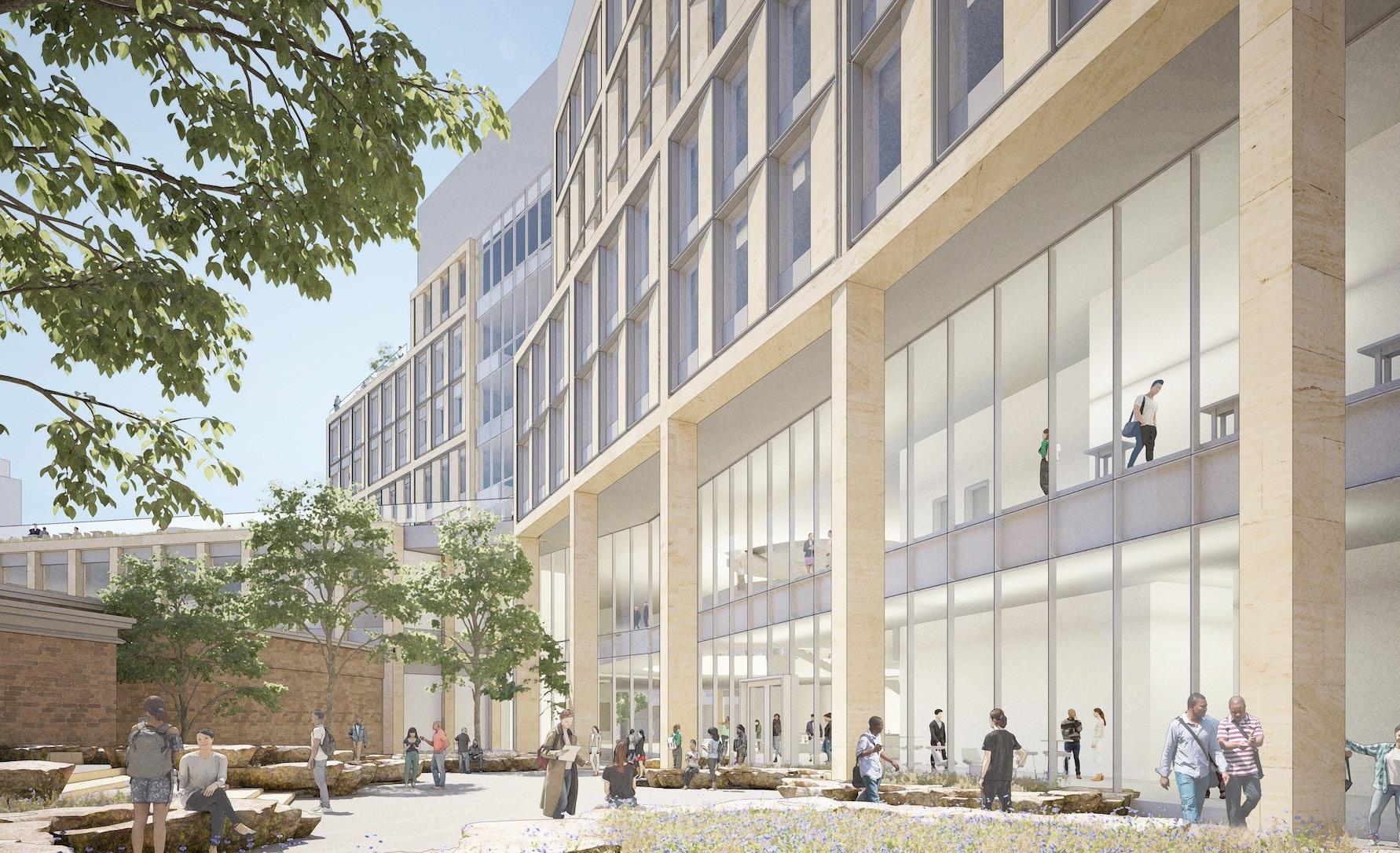
news dailycardinal.com Welcome Back Issue 2023 l 5 COURTESY OF KAHLER SLATER AND LMN ARCHITECTS
Dane County braces for hotter summers due to climate change
By Marin Rosen STAFF WRITER
Dane County experienced near record-breaking heat during the summer, and hotter temperatures have continued into September.
Extreme heat events and poor air quality during the summer caused event cancellations and stress on energy grids as demand spiked for electricity to cool homes and businesses.
And on Sunday, the University of Wisconsin Police Department reported 250 people received medical observation for heat-related issues at Camp Randall Stadium after temperatures soared into the low 90s during the Wisconsin Badgers’ first home football game of the season against the Buffalo Bulls.
The football game — the hottest ever played at Camp Randall, according to meteorologist Charlie Shortino — follows a summer of excessive heat, drought and poor air quality from Canadian wildfire smoke, according to Dane County Executive Joe Parisi.
“While there have been periods of relief, this summer has been warmer and drier than normal,” Parisi said.
City and county officials in response have been developing programs to mitigate the effects of the heat on residents and create initiatives to combat
climate change.
While rising temperatures in Madison and Dane County affect all residents, University of Wisconsin School of Medicine and Public Health professor Richard Keller raised pressing concerns for vulnerable groups of people during the heatwave.
“The critical concerns are with the most vulnerable people: those who work outside, older people who are physiologically at risk due to their bodies’ decreased ability to regulate their own temperatures and high risk of dehydration, and those who take certain classes of drugs,” Keller said.
Experts blame climate change for extreme heat
Dane County’s heat index reached a record-breaking 114 degrees in August 2023, according to the National Weather Service.
The number of these extreme heat events is expected to increase by the middle of the century, according to city estimates. This heat poses a health risk to residents, including breathing problems, heat exhaustion and heat stroke.
Experts like Keller blame climate change for more frequent extreme heat events and a predicted overall rise in temperatures as well.
“There has been intense heat in Wisconsin this summer, but focusing on recordbreaking temperatures misses the point,” Keller said. “The most important thing to watch is general trends: are average temperatures increasing? Is air quality getting worse? How is that combination affecting vulnerable people?”
When evaluating the hazards of extreme heat, Morgan Finke, communications coordinator at Public Health Madison & Dane County said the public health department added climate change as a “contributing factor” to dangerous heat events.
County sets initiatives, provides resources for residents
Parisi created the Office of Energy and Climate Change to tackle the county’s response to climate change.
“Dane County has taken many steps to address climate change,” Parisi said. “In fact, the county’s efforts are so extensive that they could be the subject of an entire series.”
Parisi has set multiple ambitious energy and emission initiatives for Dane County. These include switching all electricity in Dane County to renewable energy sources by 2025, turning facility, fleet and land operations carbon neutral by 2030
and increasing Dane County’s climate resilience.
“All county facilities — not just those utilized during excessive heat conditions — receive appropriate and necessary maintenance, repairs and upgrades to ensure that they are prepared for any weather conditions,” Parisi said. “The county takes very seriously its responsibility to carry out its functions in a manner that is safe and comfortable for its employees and for those seeking services.”
Additionally, county and city officials are in the process of providing more resources to protect vulnerable communities from the heat, Parisi said, including the construction of a new overnight shelter for single homeless men.
“The new, modern facility will have greater capacity and improved access to services and should provide an energy efficient and comfortable atmosphere regardless of weather conditions,” Parisi said.
In addition, the National Weather Service issues “various heat-related alerts to inform the public about dangerous heat conditions,” according to Finke.
These alerts include excessive heat warning, heat advisory, excessive heat watches and excessive heat outlooks.
“As soon as we do get a warning, we begin working on
providing public health education about the best ways to stay safe and healthy during the heat,” she said. “We communicate about these things through our website and social media.”
Finke told The Daily Cardinal extreme heat and air quality will receive increased focus and resources in future analyses.
To stay safe during extreme heat events, Keller encouraged residents to stay cool for a few hours per day to foster and protect the body’s natural resilience.
“People also need to reach out to their vulnerable neighbors to make sure that they are staying safe.” Keller said. “Connect with older residents and those who might otherwise be at risk to make sure they are doing what they can to stay cool and drink plenty of water.”
Cooling centers are available to residents who need a safe place to reside during extreme heat. Locations include public places like churches, community centers and libraries.
Parisi assured Madison and Dane County residents that the city is taking climate change seriously.
“We are doing our part to become carbon neutral, promote and develop renewable energy and to improve the efficiency of our buildings,” Parisi said. “Not only that, we are doing our part to help others do the same.”
UW officials embrace diversity, free speech at convocation
By Jasper Bernstein ASSOCIATE NEWS EDITOR
Content warning: This story contains informationaboutsexualassault.
The University of Wisconsin-Madison held a first-year student convocation ceremony Tuesday amid a series of incidents that put UW-Madison into headlines, including Memorial Union’s pier collapsing and a violent sexual assault on State Street.
Tuesday’s ceremony welcomed thousands of students to campus at a time when UW-Madison and the UW System are entangled in discussions over free speech and belonging.
UW-Madison faced criticism from top state Republican lawmakers this summer regarding its diversity, equity and inclusion initiatives. GOP legislators thwarted significant budget proposals while reducing the UW System’s funding by $32 million. Assembly Speaker Robin Vos, R-Rochester, said the funding cuts matched the amount of money UW campuses spend on DEI programs.
UW-Madison administrators in speeches during the convocation ceremony Thursday encouraged free expression, similar to statements made after a video depicting a white UW-Madison student saying violent racist remarks surfaced in May.
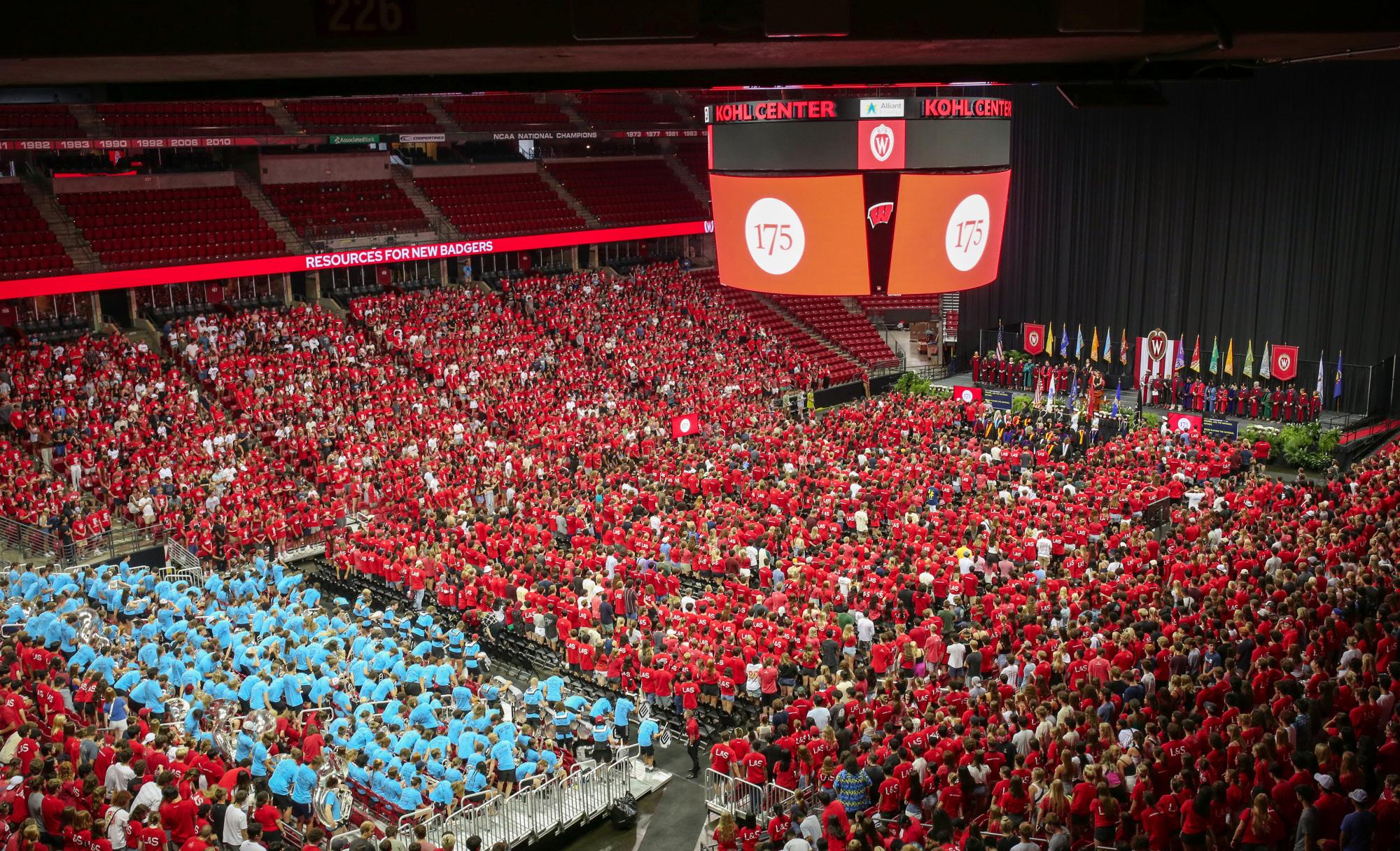
“Embrace this diversity and be comfortable with the uncomfortable,“ said LaVar Charleston, UW-Madison deputy vice chancellor for diversity & inclusion.
Chancellor Jennifer Mnookin centered free speech throughout her remarks.
“There is no doubt that freedom of speech is a heck of a lot easier to believe in when you agree with the speaker, but it’s probably most important when you don’t,” Mnookin said.
Mnookin also announced UW-Madison’s
2023-24 Go Big Read book as “How Minds Change” by David McRaney, a book which encourages active listening to understand diverse viewpoints.
The chancellor then focused on first-year students, who she claimed “are part of the tapestry who makes us who we are.”
The Menominee Indian Tribe of Wisconsin took center stage for a portion of the event, following an initial land acknowledgment that
recognized the historical “forced removal of the Ho-Chunk people” from Wisconsin.
“This place has good energy,” said Annie Jones, a UW-Madison professor from the Menominee Indian Tribe, who shared positive qualities that Badgers represented in her tribe. “Know that ancestors want you to do well and be well here.”
Additionally, Mnookin in her speech addressed Sunday’s sexual assault with a som-
ber tone while lending support to the victim.
“We are holding the student and her family in our hearts… this is certainly not the way we hoped to begin this school year,” she said. “No place is completely safe, including Madison.”
The event ended with a positive tone from the administration.
“We won’t all be together again until graduation day,” Mnookin said. “You will leave here a very different person than you are today.”
news
CORA SPYCHALLA/THE DAILY CARDINAL 6 Welcome Back Issue 2023 dailycardinal.com
arts
Here’s a peak at what the Madison art scene has in store for fall 2023
By Gabriella Hartlaub & Noah Fellinger
ARTS EDITORS
With students, new and old, returning to campus and Madison locals setting aside their swimsuits in favor of warm fall sweaters, it’s this time of year when Madison comes to life.

From concerts performed by big-name artists to local indie bands, comedy shows and movie premieres, there’s something for everyone.
The Daily Cardinal compiled a list previewing just a few of the most notable arts events happening in fall 2023.
Diana Ross Concert
Sept. 12, 2023 at 7:00 p.m.
The Orpheum Theater
Ticketed
There ain’t no mountain high enough for acclaimed R&B and pop artist Diana Ross, who is set to perform at The Orpheum Theatre this September. Ross is among the most influential musicians of this and the past century, with twelve number-one hit singles on the Billboard Hot 100 from throughout her career.
Feestet Concert
Wisconsin Union Theater
Sept. 15, 2023 at 7:30 p.m.
FREE
The Wisconsin Union Theater is presenting a free concert by the jazz ensemble Feestet. The band dubs itself “gateway jazz,” and promises a show that will excite even those who don’t prefer listening to jazz as a genre.
Not Another D&D Podcast
The Barrymore Theater
Sept. 14, 2023 at 8:00 p.m.
Ticketed
Get out your dice and miniatures, because the “Not Another D&D Podcast” crew is set to play Dungeons and Dragons live at the Barrymore Theater. This humorous and lively podcast features actors Brian Murphy, Emily Axford, Jake Hurwitz and Caldwell Tanner playing a group of colorful fantasy characters tasked with cleaning up the messes left by the group of chivalrous heroes who came before them.
Ms. Holmes & Ms. Watson –
Apt 2B
Sept. 14-24, 2023
Ronald E. Mitchell Theatre
Ticketed
This witty, endearing and hilarious gender-swapped subversion of Sir Arthur Conan Doyle’s classic Sherlock Holmes stories is returning to the Mitchell Theatre for a second run after its warm reception this summer. Read more about this must-see university production in The Daily Cardinal’s review of the play’s first run.
Sunday Tour: Chazen’s Greatest Hits
The Chazen Museum of Art
Sept. 17, 2023 at 12:00 p.m.
FREE
This informative tour of UW-Madison’s free art museum shows you the most important parts of the Chazen, and it will leave you wanting to make time to see the rest of the museum.
Homecoming Kick-off Concert: Armani White & D.A.R.S. Varsity Hall, Union South
Sept. 30, 2023
FREE
Kick off UW-Madison’s 2023
Homecoming with a free concert from Armani White & D.A.R.S, hosted in Varsity Hall at Union South. Rapper Armani White, who released his first album “Keep in Touch” in 2019, first rose to notoriety with his hit Billboard Hot 100 single “Billie Eilish.”
Spider-Man: Into the SpiderVerse: Live in Concert
The Overture Center
Oct. 4, 2023
Ticketed
The Academy Awardwinning animated film “SpiderMan: Into the Spider-Verse” is coming to Madison’s Overture Center with a twist: live musicians will play the film’s score, along with a DJ live on stage to capture the hip hop elements of the film’s soundtrack. The
film is two hours long with a 50 minute intermission and tickets are around $40 each.
The Band Camino
The Sylvee
Oct. 14, 2023
Ticketed
Famous for songs like “See You Later” and “I Think I Like You,” The Band Camino, a rock band created while its members were college students in Tennessee, will play their greatest hits and songs from their new album “The Dark” that was released in August. Tickets start at $40 for a fun live show at the Sylvee.
Mania: The Abba Tribute
Oct. 22, 2023
The Orpheum Theater
Ticketed
Although the international pop sensation stopped touring 43 years ago, that doesn’t mean you have to miss out on the experience of seeing ABBA live in concert. This award-winning show has traveled the worldover to recreate the magic of the much-beloved supergroup, visiting such famed venues as the Strand Theatre in London’s West End and the Deutsches Theatre in Munich. Mark your calendar for when “Mania: The ABBA Tribute” arrives at The Orpheum Theater in October!
The Taylor Party The Sylvee
Nov. 3, 2023
Ticketed
For those who can’t get tickets to Taylor Swift’s Eras Tour, “The Taylor Party” can fill the gap. This show is a dance party set to all of Taylor’s greatest hits with a crowd that matches any Era’s Tour energy. Tickets start at $18.
Twelfth Night
Nov. 9-19, 2023
Ronald E. Mitchell Theatre
Ticketed
“Twelfth Night” is the second production to be performed by UW-Madison’s Department of Theatre and Drama this fall. This romantic -comedy musical, inspired by Shakespeare’s classic play, sees young heroine Viola disguise herself as a man to court a countess. However, she ends up catching feelings for a duke in the process. Tickets go fast, so make sure to reserve your seat soon!
Cinematheque Fall Premieres Series
Thursday nights at 7:00 p.m.
4070 Vilas Hall FREE
UW-Madison’s Cinematheque brings premiere films from around the world to campus every Thursday. All films on Thursday nights are early access or exclusive looks at films from all over the spectrum of filmmaking, and the
films come in many different languages and styles. Film screenings are free, and the Cinematqeue has screenings all throughout the fall.
Insistent Presence:
Contemporary African Art from the Chazen Collection
The Chazen Museum of Art Sept.-Dec. 2023 FREE
Look into contemporary African art found at the Chazen in this special exhibit that attempts to show a new look at modern African life and raise the profile of African artists. The exhibit also examines how artists use visualizations of the human figure to ask questions about political issues, cultural identities and social histories. This exhibit is a great stop for anyone looking to learn more about African history through art.
Just Bust! Open Mic Night
Wisconsin Historical society
First Friday of the month FREE
Just Bust! is one of Madison’s longest-running open mic events, featuring short performances by amateur artists from throughout the Madison area. Those interested in performing are invited to reserve a spot through their Eventbright page or to sign up in person starting at 8 p.m. the night of the event.
dailycardinal.com Welcome Back Issue 2023 7 l
ZOE KUKLA/THE DAILY CARDINAL
On traveling to your morning classes:
Oh the walk is beautiful, peace- ful, restful, wonderful. Truly a religious experience all to yourself, especially in the fall and late spring.
UW-Madison, from Dawn till Dusk
On surviving an 8 am class:
Have a morning routine you can look forward to! I put on some coffee or tea right away, make myself breakfast and try to go on a quick walk before starting the day.
—Liam Beran
On evenings in Madison:
On Daylight Savings time and evening classes:
I always find it funny in the winter months when I enter class and there is bright daylight outside, but by the time I leave class it is pitch black outside.
I love going biking through the Arboretum right before sun- set, since you get a good view across Lake Wingra. It’s espe- cially beautiful in the Fall.
On the virtues of Madison in the mornings:
Driving around Madison watching the city come alive while the sun comes up is wonderful.
On the virtues of Madison in the mornings:

For the early morning, make sure not to rush and to take your time. Starting off a morning calm and collected is much better than rushing and setting a bad tone for the day. It’s also best to get your schoolwork out of the way during the daytime so you can explore the city and hang out with friends at night.
—Drake White-Bergey
On a favorite memory of Madison in the morning:
On the very last day of freshman year before move-out, my friends and I stayed up all night and watched the sunrise over Lake Mendota from to Porter Boathouse docks. It was absolutely gorgeous -- an ethereal experience, truly.
On watching the sun set over Madison:

My favorite experience watching the sunset in Madison was towards the end of the semester last semester. My friends and I watched the sunset together on the dock talking about how the end of our freshman year was coming up.
—Ashley
On bucket list items for the academic year:
Picnics at James Madison park at sunset are iconic. Early morning trips to Picnic Point to watch the sunrise are even more iconic. It’s worth it to try to view both at some point during the year.
On activities to do after dark:
One of my favorite evening activities is going out to eat with friends. I would 100% recommend Bel-Air Cantina! Another fun at night activity would be going night swimming in Mendota with friends.
—Ashley Barrera
8 • dailycardinal.com Welcome Back Issue 2023 • 9 special pages MEGHAN SPIRITO/THE DAILY CARDINAL LAUREN AGUILA/THE DAILY CARDINAL
—Ashley Barrera
—Drake White-Bergey
Barrera
—Tyler Katzenberger
—Tyler Katzenberger
—Tyler Katzenberger
Air Raid offense takes backseat to running back duo in Badgers’ win over Buffalo
 By Grant Matheny STAFF WRITER
By Grant Matheny STAFF WRITER
It’s been one of college football’s most familiar plays for years: A Wisconsin running back streaking down the field, dodging opposing defenders and running into the endzone.
Regardless of who was coaching or playing, the Wisconsin football program has remained consistently excellent in this one area. While most of the country had moved to a pass-heavy offense, the Badgers were happy to run the football to success.
The 2023 season was expected to mark a deviation from Wisconsin’s familiar rush-heavy attack after the firing of Paul Chryst. Under new head coach Luke Fickell and offensive coordinator Phil Longo, the Badgers were expected to bring a more modern approach to Wisconsin’s offense.

But in Wisconsin’s week one victory over Buffalo, the Badgers’ traditionally dominant running game took over once again.
About halfway through the third quarter, Wisconsin found itself in a battle with a gritty Buffalo squad. Badgers quarterback Tanner Mordecai threw a costly interception and was having little success throwing the ball downfield. In a game where the Badgers were significant favorites, things weren’t going according to script.
That was, until midway through the third quarter, when senior running back Chez Mellusi broke off an 89-yard touchdown run reminiscent of former Badger greats like Melvin Gordon and Jonathan Taylor.
Runs like Mellusi’s have propelled the Badgers to victory for decades. What UW-Madison has often lacked in quarterback play or playmaking at the wide receiver position has been
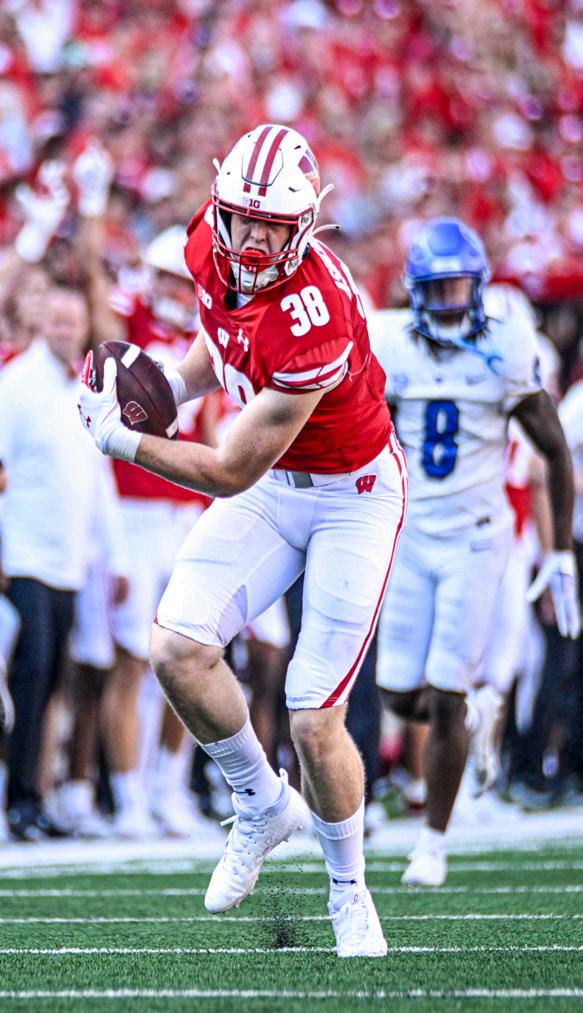
made up for in the backfield.
Even with new coaches and personnel, Wisconsin’s running game appears to be as good as ever. In the win, the Badgers rushed for 314 yards and four touchdowns. Chez Mellusi recorded 13 carries for 157 yards. The Badgers’ other star running back, Braelon Allen, also had an effective game. Allen rushed for 141 yards on 17 carries, including a long run of 37 yards.
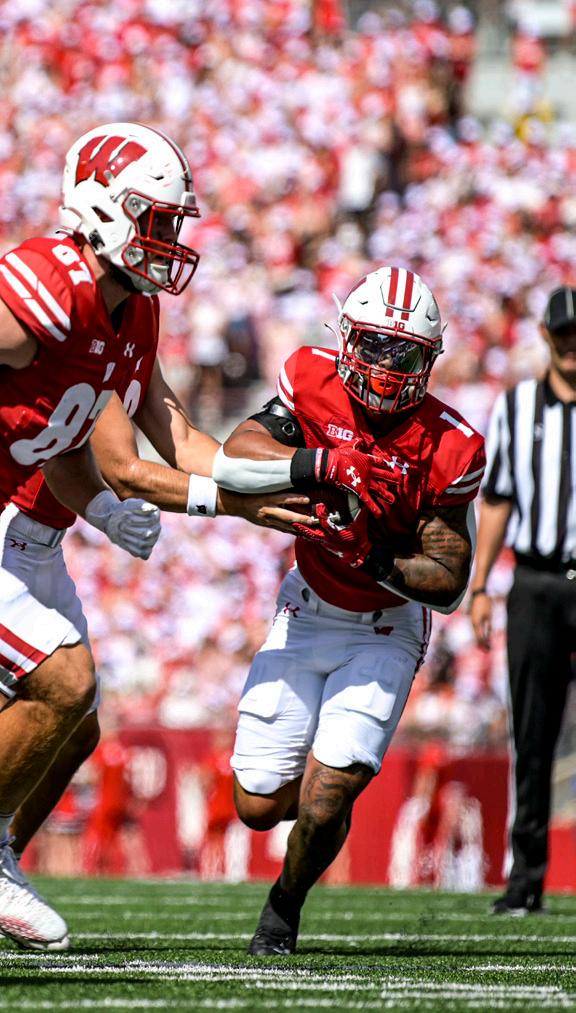

Wisconsin’s passing attack is expected to look sharper as the season continues despite Saturday’s win.
But if Saturday’s win over Buffalo proved one thing, it’s that Wisconsin won’t shy away from their identity. Wisconsin has always been a runfirst program. And the Badgers continued that tradition for at least one more week.
No. 1 Badgers take down Lady Volunteers in highly contested
 By Dylan Goldman STAFF WRITER
By Dylan Goldman STAFF WRITER
On an afternoon of celebration where they raised the 2022 Big Ten Championship banner, the No. 1 Wisconsin Badgers’ day went from euphoric to nervewrecking in a pulsating match against No. 24 Tennessee.
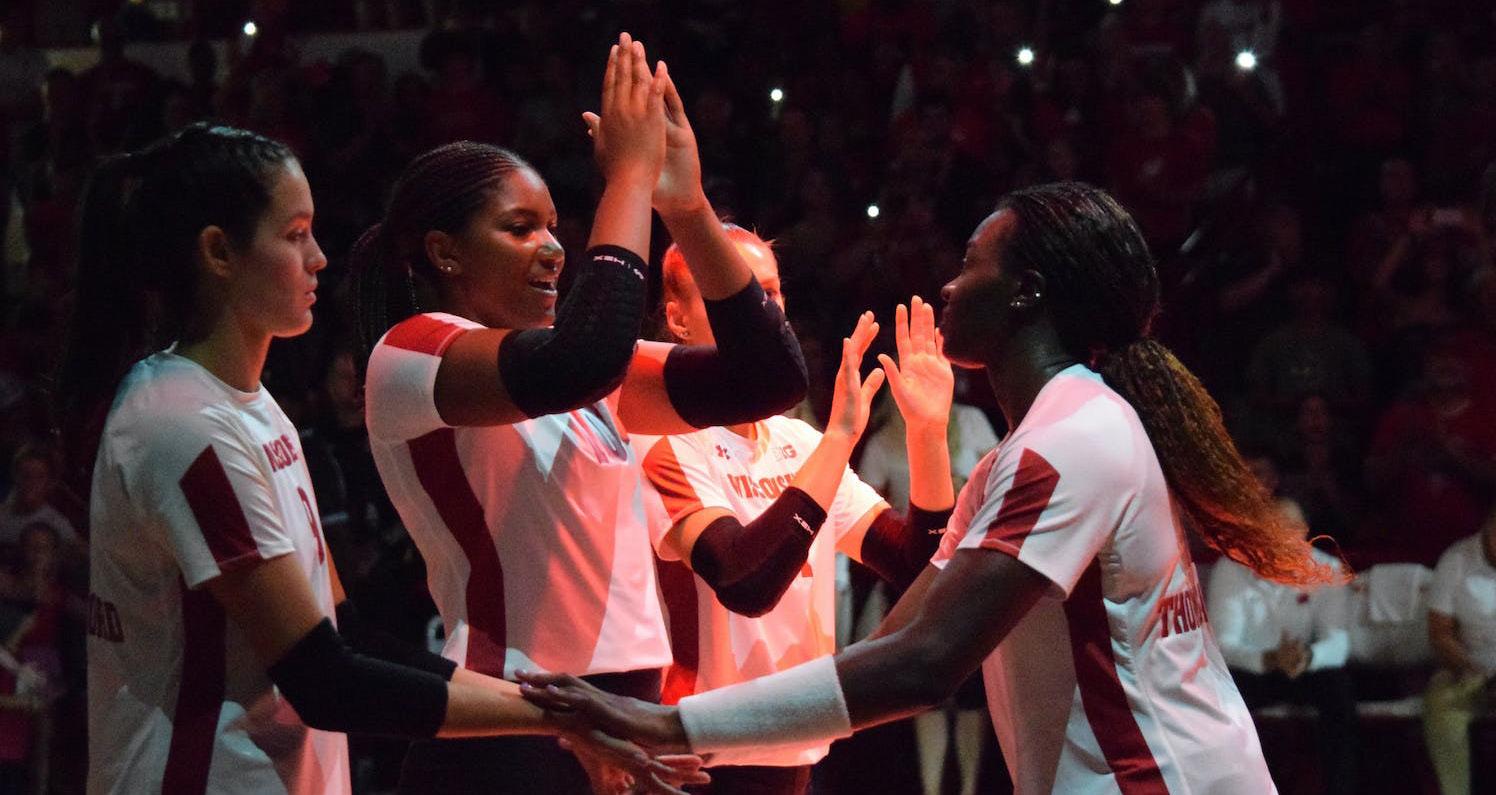
The match got progressively more difficult for the Badgers as it went along. They won the first set 25-16, but the second set was more arduous. It was all tied at 22 points before a kill from Anna Smrek gave Wisconsin what at the time seemed like a match-sealing 2-0 lead. Tennessee roared back though, claiming the third set 25-18 and staving off a couple Wisconsin rallies to take the fourth set 25-20.
The Badgers led 6-1 in the fifth set before the pesky Lady Volunteers tied the set at 10 points apiece. A kill by Carter Booth restored the Badgers’ lead for just a moment as Wisconsin went up 12-10 on the following play, but a review overturned the point and tied the game at 11 points. Then, an attack error by Booth gave Tennessee a 12-11 advantage, flooding the raucous University of Wisconsin Field House with pal-
pable nervous energy.
Badger veterans then stepped up and delivered when they were needed most. First, senior stalwart Devyn Robinson delivered a crucial kill to knot the game up once again at 12 points. Then, a service ace from Julia Orzol restored Wisconsin’s lead and allowed the Badger faithful to take a quick breath.

Wisconsin served for the match point but were denied by a kill from Tennessee’s Morgahn Fingall. Staring down another tie game, Sarah Franklin came to the rescue with a clutch kill to seal the 3-2 win for the Badgers.
“It was a battle. At the end, I loved the mentality we came out with,” head coach Kelly Sheffield said. “We took our foot off the gas for a little bit, [but] the fact that we were able to get going in the fifth is a real credit because, in our sport, that’s hard to do.”
Franklin was Wisconsin’s taliswoman yet again with 23 kills. Booth played a big role as well by recording eight kills and adding eight blocks.
Wisconsin had a .306 hitting percentage, but Tenneesse backed themselves up with 12 service aces.
The Badgers — who were anoint-
ed as the No. 1 team at the beginning of the week — survived their second scare in a few days after coming off a similar 3-2 victory against No. 21 Arkansas in Fayetteville. But Sunday’s match was at home, and Franklin said it made a difference in willing the Badgers to a victory.
“There’s nothing like the Field House,” Franklin said. “I love when everyone’s on their feet and rooting for you because it gets the other team and you can just feed off the energy really easily.”
The Badgers move to 5-0 on the season with four ranked wins to their name. Wisconsin will return to action Thursday night against Arizona back at the UW Field House.
sports 10 Welcome Back Issue 2023 dailycardinal.com l
PHOTOS BY EVAN HALPOP/THE DAILY CARDINAL PHOTOS BY MEGHAN SPIRITO/THE DAILY CARDINAL
Hottest game in Camp Randall history highlights severity of climate change
Badger fans packed the stadium for the season opener Saturday despite temperatures soaring over 90 degrees
By Madelyn Anderson SCIENCE EDITOR
If you’re a fan of Badger football, you’ve likely heard buzz about new aspects of this season. Saturday’s game brought the first appearance of head coach Luke Fickell, a look at new quarterback Tanner Mordecai and legendary plays from Chez Mellusi.
However, one “first” loomed larger than the electric energy on the field and was felt throughout the stadium: recordsetting heat.
The 91-degree temperature marked the hottest-ever football game at Camp Randall Stadium in Badger history. Despite the extreme conditions, 76,224 fans
“I heard it’d be hot, but I figured my first student football game would be worth it.”
Stella Beidel UW-Madison freshman
sold out Camp Randall for the season opener.
New Badgers typically anticipate swaying to “Varsity,” sporting striped overalls and standing for hours on the bleachers at their first game.
Now, climate change is altering these traditions, as Beidel noted.
“I saw more people sitting down and leaving earlier than I expected,” she said.
“Participating in ‘Jump Around’ was a lot harder, too.”
The first 7,500 fans were given a free red and white water bottle and bucket hat to reward their dedication to supporting the team. Still, students like Beidel and her friends resorted to soaking the hats under bathroom sinks during halftime to keep cool.
UW-Madison aided safety efforts by allowing each fan to bring in two water bottles — doubling the amount available for sale — and adding four additional water stations to the stadium.Misting fans and cooling tents were also available to football attendees.
But the high heat still heavily affected individuals. UW Athletics anticipated this by employing extra medical staff for the game, who provided on-site health observations for 250 fans. There were also 50 calls for first aid, 36 for paramedics and nine people transported by ambulance, according to statistics released after the game by the UW-Madison Police Department.
Additionally, the heat inter-
fered with athletic photography. The Wisconsin State Journal reported heat waves distorted multiple images from the game, blurring the classic Badger colors together and dampening clarity.
What is causing these new record-setting realities? Put simply, climate change.
Scientists have long collected evidence for global warming as a result of human activity. For example, this time series tool from the National Oceanic and Atmospheric Administration (NOAA) displays widespread and steady increases in land and ocean temperatures.
Heat is manifesting itself in new ways throughout Wisconsin as climate warming trends continue.
Besides Bucky breaking an extra sweat at Camp Randall, counties across the state experienced effects from a heat dome in August. A heat dome occurs when hot air is trapped over large regions as a result of atmospheric winds.
The consequential high temperatures and humidity prompted heat advisories and even closed schools in Milwaukee. Back in Madison, university officials monitored the extreme conditions and made changes to summer programming as necessary.
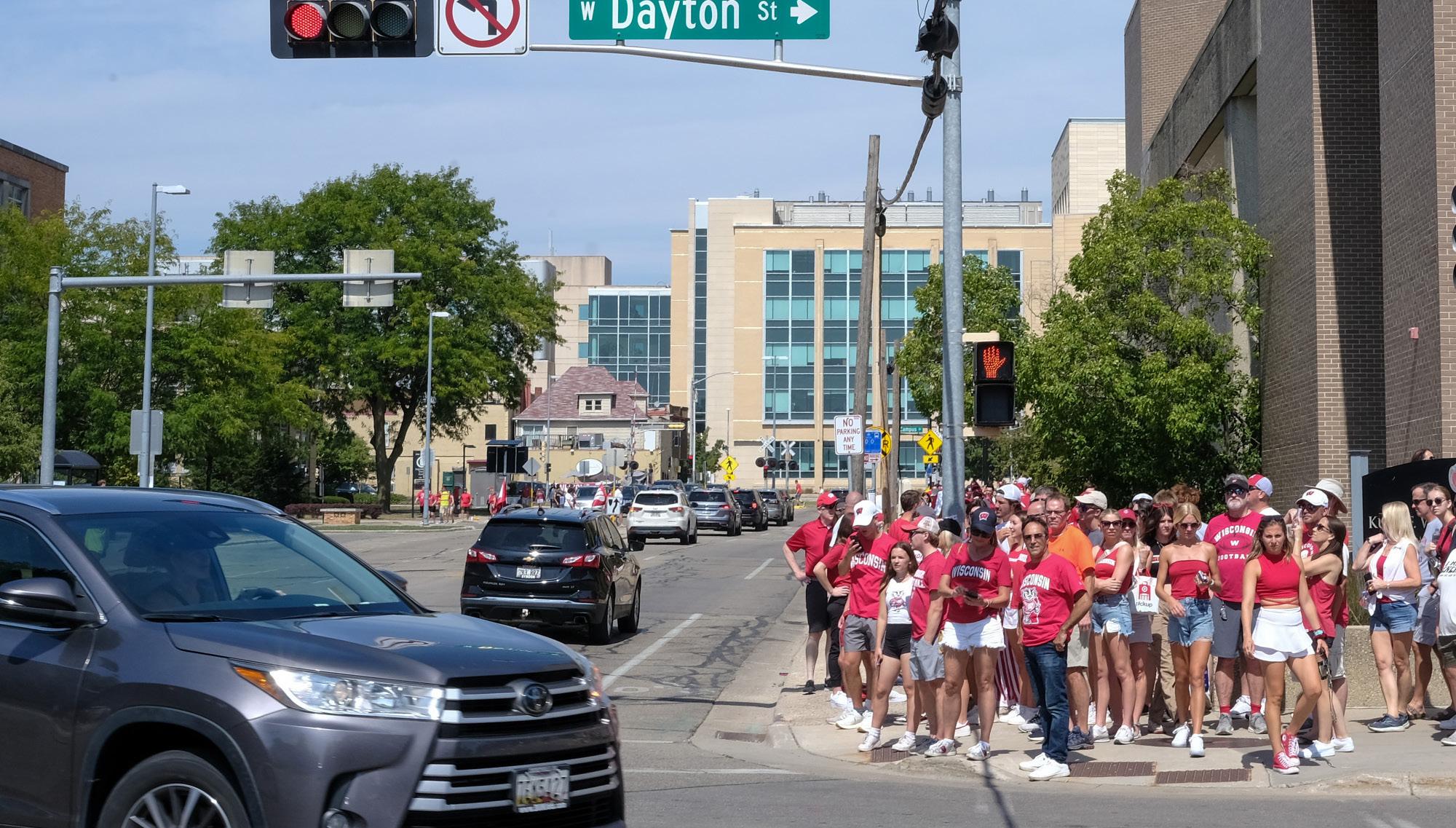
Cities like Madison and Milwaukee are more likely to need preventive measures to face the heat because they are susceptible to the urban heat island effect.
According to the Community Economic Development Division of Extension, urban heat island effect occurs when pavement and building materials store and radiate heat in built areas during the summer without trees and other vegetative cover to provide shade — for example, Camp Randall.
Scientists seek health warning system for extreme weather
Considering this summer and Saturday’s experiences, it’s clear climate change will be infiltrating Badger football and beyond. It may become common for temperatures to rise with your excitement as you anticipate season openers and the first summer night at the Memorial Union Terrace.
While checking advisories and taking precautions before going outside may not be ideal, these practices are vital in an ever-warming world.
Even though it may feel defeating to have the sun burning brighter on your skin, these changing climates are shining light on new efforts in
scientific research.
Larry Kalkstein, a UW-Madison climatologist, is partnering with Nelson Institute PhD students Elizabeth Berg and Becky Rose as well as Public Health master’s student Sara Pabich to develop a health warning system for citizens in Madison and Milwaukee.
The study, which is part of the Wisconsin Heat Health Network, could bring new applicable coping mechanisms to student and community populations.
Checking climate-specific weather apps and packing extreme weather apparel may become the new normal. Additionally, directing resources to at risk populations may be increasingly prioritized.
The effects of extreme weather will look different for everyone. Maybe you’ll live in a dorm without air conditioning. Maybe you’ll be stranded without transportation on a cold January day. Or maybe you’ll be baking in the sun on the bleachers of Camp Randall.
No matter the situation, remember to stay safe. And when you’ve recovered from the conditions, follow tips for climate resilience. While global warming has varying individual impacts, communities can band together for positive change.
dailycardinal.com Welcome Back Issue 2023 l 11 science
CARDINAL
LIAM BERAN/THE DAILY
Column: Five takeaways from the first Republican debate
 By Graham Brown OPINION EDITOR
By Graham Brown OPINION EDITOR
Republican candidates for president — minus the front-runner — jostled for position in the first debate of the 2024 Presidential cycle for two hours on August 23 in Milwaukee.
The debate’s location in Milwaukee symbolized Wisconsin’s importance to the electoral college and the candidates made their case to lead the party in a debate that was thin on policy but full of namecalling and interruptions. It was, after all, a primary debate.
Here are five takeaways from Wednesday’s debate:
Republicans fractured over abortion
Abortion, an issue long championed by social conservatives and an energizer for swaths of Republican foot soldiers, seems on the edge of driving a stake through the party. With Roe v. Wade overturned, the candidates have been forced to pivot away from platitudes about “appointing conservative justices” and towards concrete policy.
What resulted was arguably the most tense, most substantive clash of the night. Asa Hutchinson and Mike Pence played the evangelical card and came out forcefully for a 15-week federal ban on abortion. But the largest applause was saved for North Dakota Gov. Doug Burgum, who pulled a pocket Constitution from his suit and declared his opposition to federal action on the issue, citing the 10th Amendment.
The snapshot illustrates how 12
months in a post-Roe world have upended American politics.
Since the Dobbs decision, voters have defeated every anti-abortion ballot measure — not just in swing states, but deep red Kansas, Kentucky and Montana.
The Biden campaign has telegraphed their intention to make abortion a central component to reelection. And if voters remain as opposed to the pro-life position as they were in 2022, the GOP will be in trouble.
DeSantis plays disappearing governor
Ron DeSantis looked far from the frontrunner despite being the leading candidate on the stage.
During extended portions of the debate, DeSantis seemed almost invisible — a man who did not want the ball.
It is unlikely this performance will wash the “stiff” and “awkward” image he’s cultivated among the minds of some voters. Unlike Pence and Ramaswamy, DeSantis never jumped into the debate unless called upon and his strongest points were often ignored by his opponents.
DeSantis consistently polled above every Republican not named Trump. But there seemed to be no one on the stage who sincerely feared him.
Republican former Wisconsin Gov. Scott Walker said at a Young America’s Foundation rally before the debate that it “was not enough to have a good performance.”
“You have to have a breakthrough performance,” Walker said.
DeSantis did not break out.
“He looked like a wallflower up there,” Donald Trump, Jr., former President Trump’s eldest son, said in the post-debate spin room. He announced DeSantis as the clear loser of the debate.
This is not surprising, as the Trump campaign rarely misses an opportunity to punch down on the Florida governor. But his analysis lines up with much of the predebate buzz.
DeSantis needed to use the two hours to prove he was the only candidate who could defeat Trump and Biden. But he largely receded into the shadows in a performance that will make his already skeptical donors more uncertain.
Ramaswamy: ChatGPT or Trump 2.0?
Most of the pack instead piled on the other center stage candidate, Vivek Ramaswamy, who seemed to bait his way into every topic Wednesday night with policy positions catered to the most extreme of online conservatives.
Ramaswamy seemed overmatched in foreign policy discussions with former Vice President Mike Pence and former U.N. Ambassador Nikki Haley on his position to cut funding for Ukraine.
Former New Jersey Gov. Chris Christie also attacked him for his opening remarks, where he ripped off Barack Obama’s famous line from the 2004 Democratic National Convention that he was a “skinny kid with a strange last name.”
“I’ve already had enough of a guy who sounds like ChatGPT standing up here,” the former Christie declared in a jab at Ramaswamy.
Yet, in most flash surveys, primary voters crowned him the victor, despite instant polling showing his numbers among women and independents crashing after his full-throated defense of Tr__ump and declaration that climate change is a “hoax.”
How Ramaswamy ultimately performs will be the biggest litmus test of the primary season and the best window into the post-Trump Republican Party.
Trump Jr. heaped praise on the 38-year-old neophyte as the winner of the debate. His positions on Ukraine and gutting the Department of Education may be too extreme for some voters in a general election, but they are right at home with a Republican base that has jolted right in the past half-decade.
If Ramaswamy can leapfrog DeSantis and finish second in the primary, it will show just how much
the party’s base has abandoned Fox News conservatism and solidify the GOP as the party of Trump for the foreseeable future.
Wisconsin overlooked despite tipping point status
Wisconsin is arguably the most important political state today. In 2016 and 2020, it was the tipping point — the state that delivered the 270th electoral vote to the eventual winner. It will likely play the same role next November, and the vote difference could be but a sliver of Camp Randall’s capacity.
Republicans so far have made the state a priority on the 2024 campaign trail. Walker acknowledged the attention Wednesday while he spoke about the importance of “exposure” and how the decision to host the first Republican debate and next August’s Republican National Convention could tip the state red.
Continuereadingonlineatdailycardinal.com
Our final warning sign: How climate change is intensifying storms and increasing our exposure to danger
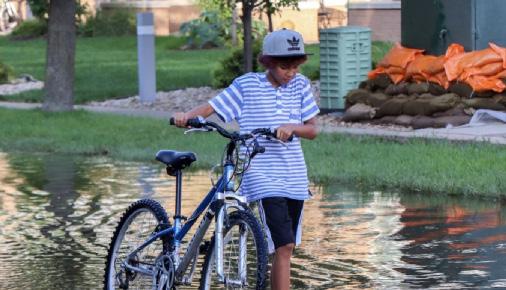 By Charlotte Relac OPINION EDITOR
By Charlotte Relac OPINION EDITOR
Hurricane season is upon us once again.
However, it seems that the rules of the game have changed. As our climate warms we are beginning to see stronger winds, higher rainfalls and larger storm surges from June until November.
These factors — strong winds, high rainfall and larger storm surges — can explain why these tropical cyclones have become more destructive, costly and deadly. Storm surges were responsible for an extra $2 billion of damage when Hurricane Sandy hit New York City in 2012.
Storm surges are coastal flooding phenomena associated with rising water levels during natural disasters like hurricanes or cyclones. Surges have recently gotten worse because of melting polar ice caps. The average global sea level has risen six inches since 1900 and almost four inches since 1970.
Rising ocean temperatures fuel these natural disasters. Higher temperatures cause water to evaporate into earth’s atmosphere and transfer heat from the oceans into the air. As the storms travel across the water, they pull in more water vapor and heat, allowing for the storm to quickly intensify before it reaches land.
Hurricanes need four “ingredients” in order to form, according to NASA: warm ocean water, excessive moisture in the atmosphere, low vertical wind shear and a preexisting disturbance. As two of the four “ingredients” — warm water and excessive atmospheric moisture — are increasing in Earth’s atmosphere, the likelihood of more severe storms increases.
To make matters even more severe, the Florida Department of Education decided to allow the Prager University Foundation to produce material on science, history and gender that have been criticized as distorting truths about multiple topics, including climate change, according to The Guardian. These materials will be shown in kindergarten through fifth grade classrooms around the state.
The Prager University Foundation, despite its name, is not an actual university but instead is a right-wing advocacy group founded in 2009.
This year Florida has experienced some of the highest ocean surface temperatures in the world, ever recorded, near the Florida Keys.
A buoy in the Everglades National Park’s waters recorded temperatures mirroring those of a hot tub — water temperatures hit 101.19 degrees
Fahrenheit in late July, with other nearby buoys nearing 100 degrees.
July 2023 also set a record for the highest ocean surface temperature in the National Oceanic Atmospheric Administration history.
By refusing to acknowledge the severity of climate change, Florida puts itself and its inhabitants at risk by refusing to acknowledge the severity of climate change. Over 40% of hurricanes hit Florida alone, making Florida the largest target for hurricanes in the United States.
But Florida is not the only state to have seen hurricanes already this season. California, known for wildfires, earthquakes and mudslides, saw their first-ever tropical storm watch in the state’s southern region last month.
California’s climate has never been seen as an ideal host for hurricanes. The Pacific Ocean’s cooler water temperatures, east-to-west wind patterns and the downward flow of air over California have typically acted as safeguards for the area. However, rising ocean temperatures and an unusual pattern of weather this year have weakened California’s safeguard.
Although we have seen abnormal and unprecedented weather patterns for years now, the change in hurricane patterns is concerning.
Hurricanes aren’t the only form of natural disasters that are being influenced by rising sea levels. “nor’easters,” or storms along the United States’ Atlantic coast, form between the months of September and April, wreaking snowy havoc.
According to a study done by the Atmospheric and Environmental Research at Rutgers University, nor’easters are two to four times more likely to occur when there are abnormally high temperatures in the Arctic.
The more links scientists uncover between changing weather patterns and climate change, the more alarms should be raised — not the other way around. In order to initiate change, the United States must
work together while simultaneously educating the next generation for what is to come. By trying to convince ourselves that climate change is not real, we put ourselves and future generations in trouble.
How we act within the next decade and where we put our time and resources will determine our fate. Scientists say that if Earth warms more than 1.5 degrees Celsius, we will be past the point of no return. We’ve already reached a 1.1-degree Celsius increase in global temperatures since the industrial age began. We need to look at these quickly evolving weather patterns and remind ourselves that these abnormal hurricanes and snowstorms are some of our last warnings.
opinion
JEFFREY BROWN/ THE DAILY CARDINAL
12 Welcome Back Issue 2023 dailycardinal.com l
DRAKE WHITE-BERGEY/COURTESY WISCONSIN WATCH
Five essential backto-school playlists
By Gracie Becker STAFF WRITER
As we return to campus for this upcoming fall semester, we will all find ourselves longing for the perfect playlist to listen to on our way to class or hanging out with our friends before a football game.
For that reason, I created specific playlists for several situations in which you may wish you could simply click shuffle and let it play.
Each playlist contains a culmination of songs I have heard around campus as well as songs that complement Madison’s culture and are true to our beloved college town’s spirit.

Here are my top five playlists for fall of 2023 in Madtown.
1. Farmers Market Saturdays
I frequently attend the farmer’s market alone and enjoy listening to sweet, happy songs while shopping for my market favorites. Composed of light-hearted, feel-good songs, this playlist is perfect to play through your AirPods as you shop the lovely Dane County Farmers Market.
• In My Life by The Beatles
Is TikTok meeting back-to-school needs?
By Maddy Heuler STAFF WRITER
As the fall semester begins and students settle into their new campus housing spaces, young adults are turning to the internet to order last minute necessities they forgot or lost in the moving process.

Viral Chinese-owned app TikTok serves as an entertainment app for people of all ages, connecting individuals across the world with a personalization algorithm known as the “For You page” The app directly tracks an individual’s personal interactions with the content they receive and outputs more content catered to their perceived interests.
The online shopping process experienced a shift after TikTok introduced its newest feature, “TikTok Shop.” The new feature allows millions of users to see and directly purchase products on the app.
As TikTok developed and won the interest of young minds, marketing and advertising within the app became a primary pathway for brand success.

The app seized an important relationship between the influx of users by creating an easy way for influencers to promote products to their audiences.. TikTok’s algorithm became key for young individuals to continue investing in the app with the possibility of “blowing up.” The algorithm allowed any users around the world to gain trac-
tion and populate massive likes and following.
So-called “influencers” started to pop up on the app in 2020, and many became household names.
If you’re a consistent user, you may be aware of Bria Lemirnade, an influencer and foodie TikToker in the heart of Madison who blew up creating food videos in her mom’s kitchen. Lemirnade had 1.8 million followers as of September 2023.
As TikTok Shop developed, many users became annoyed by the influx of advertisements populating their For You page. But influencers are now given an easy avenue to recommend products to their followers, with easy links to purchase more and more products such as dorm bedding, apartment decor and favorite back to school necessities.
• She’s A Rainbow by The Rolling Stones
• Dorothea by Taylor Swift
• Joy Of My Life by Chris Stapleton
• You Can Close Your Eyes by James Taylor
2. Wisco Gameday Badgers love fall football gamedays. Some even consider getting ready for the game to be the best part of game day. Here is an energetic playlist to get you pumped up for a big day at Camp Randall — throw this on at a tailgate, in your bathroom while doing your makeup or on a clip-on speaker for your walk to the stadium. By the end of the third quarter, you’ll be ready to jump around!
• Build Me Up Buttercup by The Foundations
• Jump Around by House of Pain
• Doses & Mimosas by Cherub
• Just Wanna Rock by Lil Uzi Vert
• Still D.R.E by Dr. Dre and Snoop Dogg
3. Cozy Study Night
As the fall semester begins and campus becomes electric with exciting social opportunities, it is important to prioritize school work first. While it stinks to turn down plans with friends in order to study, I find that a peaceful study playlist, a cup of your favorite tea and a lovely candle make doing so a whole lot easier. This is a playlist that is calm and understated, containing some of your favorite songs that won’t overpower your brain while you’re trying to write your paper or study for your upcoming
exam. Who said studying couldn’t be enjoyable?
• Slow Dancing In A Burning Room by John Mayer
• Sparks by Coldplay
• Killer by Phoebe Bridgers
• Apocalypse by Cigarettes After Sex
• Vienna by Billy Joel
4. Mendota Music
One of the best parts about returning to campus is soaking up what remains of summer weather on the Mendota piers with best friends you haven’t seen in a while. This playlist reflects those happy feelings with youthful, upbeat and summery songs that will send your school scaries away. We’ll be bundling up in parkas before we know it, so head down to the lake and enjoy the nice weather while you can!
• Beast of Burden by The Rolling Stones (Sittin’ On) the Dock of the Bay by Otis Redding
All Your’n by Tyler Childers
• How Sweet It Is (To Be Loved By You) by James Taylor
• American Girl by Tom Petty and the Heartbreakers
5. OTW to Class
Those who have had
classes in Agriculture Hall or at the top of Bascom Hill understand how important it is to have a fun playlist to get you through your walk to class. Additionally, walking to great music on your way to your 8:00 a.m. lecture will wake you up and make you more prepared to take on the day. This playlist fosters a campus fall aesthetic with more alternative songs. Skip the bus and get your steps in with the help of these tracks.
• Jumper by Third Eye Blind
• Sedona by Houndmouth
• The Adults Are Talking by The Strokes
• Good Riddance (Time Of Your Life) by Green Day
• Sullivan Street by Counting Crows
Along with the beginning of fall courses comes much stress. Let these playlists eliminate the stress of figuring out what music to play and enjoy the ability to shuffle great music with ease. This semester, remember to allow yourself to make time for those fun situations in which playlists such as Mendota Music or Farmer’s Market Saturdays may be useful, while also putting your best foot forward in your academic endeavors. Have a wonderful fall semester Badgers!
dailycardinal.com Welcome Back Issue 2023 l 13 life & style
From brick-and-mortar to online to TikTok, shopping has shifted with the internet
GRAPHIC BY HAILEY JOHNSON/THE DAILY CARDINAL
Give these playlists a listen to enhance your fall semester at UW-Madison
GRAPHIC BY ZOE KUKLA/THE DAILY CARDINAL
Civil rights activist Robin Vos continues fight to end racism
By Omar Waheed STAFF WRITER
Martin Luther King Jr., Malcolm X, W.E.B Du Bois, Farrakhan, Dr. Umar Johnson and Robin Vos. What do
each of these names have in common?
All are champions in the plight to end racism in the United States.
Few hallow names carry through history as these heroes of the civil rights era. Now, Wisconsin state Assembly Speaker Robin Vos, R-Rochester, has taken up the torch running as he vows to end DEI efforts in UW System schools.
It is certainly easy to think Vos’ proposition is insane. These services are, after all, vital for protecting several classes of marginalized groups like Black, Latino and Hispanic, Asian and LGBTQIA+ people as well as the poor, the elderly, the disabled, and veteran students and faculty.
These services, which cost $32 million — .048% of the UW System’s operating budget and protect the state’s most vulnerable populations — are a waste of our state’s $7 billion surplus, and Vos knows it.
Vos vowed to cut these services to finally end racism — a task thought to be impossible by most, but not Vos.
“We are not giving UW that money unless they work with us to eliminate all these racial preferences and all the things that are rampant on college campuses,” Vos said. “The overt racism, the overt

exclusion, the overt indoctrination is so deep inside the UW System. I am embarrassed to be an alumni.”
But that’s not all. Vos has once again taken a sledgehammer to the city of Milwaukee to finally end some of the nation’s most drastic racial segregation.
The latest local government funding bill aims to avoid spending the state’s hard-earned $7 billion surplus on frivolous things like equity initiatives and street cars. Vos promised to use it for meaningful things we need: for our wealthy to get wealthier.
“That’s not what taxpayer dollars should be for,” he said. “If you want to raise money in the private sector, if you want to have a bake sale or put money into your own ideology, you have every right to do that because we live in America. But it’s not the right to use taxpayer dollars to try to push one ideology over another.”
Vos’ plight to heal the nation often falls on deaf ears. But he knows the work is hard and that it could be years before any progress is made.
“You’ve always told me, ‘It takes time.’ It’s taken my father’s time, my mother’s time, my uncle’s time, my brothers’ and my sisters’ time. How much time do you want for your progress? The time is now,” Vos said passionately. “I have a dream.”
Vos is currently organizing a sit-in at the Multicultural Student Center at UW-Madison until action is taken.
 By Morgan McCormack STAFF
By Morgan McCormack STAFF
Hey Morgan! My parents are really bugging me to get a job next semester, but it seems like too much work with all the classes I’m taking. What do I do to get them off my back?
Listen — I understand the struggle. I’m not built to work either. But if you want to keep living off daddy’s dime, you’ve got to do something that’s “more valuable” than some minimum wage job. That being experience.
Whether you have plans to further your education after undergrad or go straight to work, everyone needs some leg up. You just need to find some B.S. internship or work study — or writing a column for the better school newspaper. If you can make it sound important (and time wasting) to your parents, their sense of pride will overcome any desire for you to get a job.
Just remember who to thank (financially) when your parents’ check cashes.
Hope this helps!
Hey Morgan! I got kicked out of school my freshman year but never told my parents. They’ve been sending me tuition money for the last five years and are asking

when I’m going to graduate. What should I do?
I’d first like to applaud you for being able to scam your parents out of, what, hundreds of thousands of dollars? If you were smart, you would’ve put it away preparing for this day so you could just drop off the face of the planet, but I know better than to assume my audience are planners.
This is what you need to do:
If I’ve learned anything from the real ID “gifting” game, there is bound to be someone that sort of looks like you at this school. Hopefully they’re graduating next semester. You just have to subtly take their place.
It’s really not that hard to do. You may be asking, “Wouldn’t their friends and family notice?” My answer is, “Not really.” I change my personality and look about every two months and no one brings it up.
The only difficult part is getting rid of the original person, and I will not be telling you how to do that, for legal reasons. Once that is done, though, you are in the clear. And if you’re worried that you don’t have the skills necessary for the career path of your new degree, just go into consulting or something you don’t really need skills for.
Hope this helps!
Civil rights activist Robin Vos rallies against diversity, equity and inclusion as part of his quest to end racism.
OMAR WAHEED/THE DAILY CARDINAL
ZOE BENDOFF/THE DAILY CARDINAL
WRITER
14 Welcome Back Issue 2023 dailycardinal.com the beet l

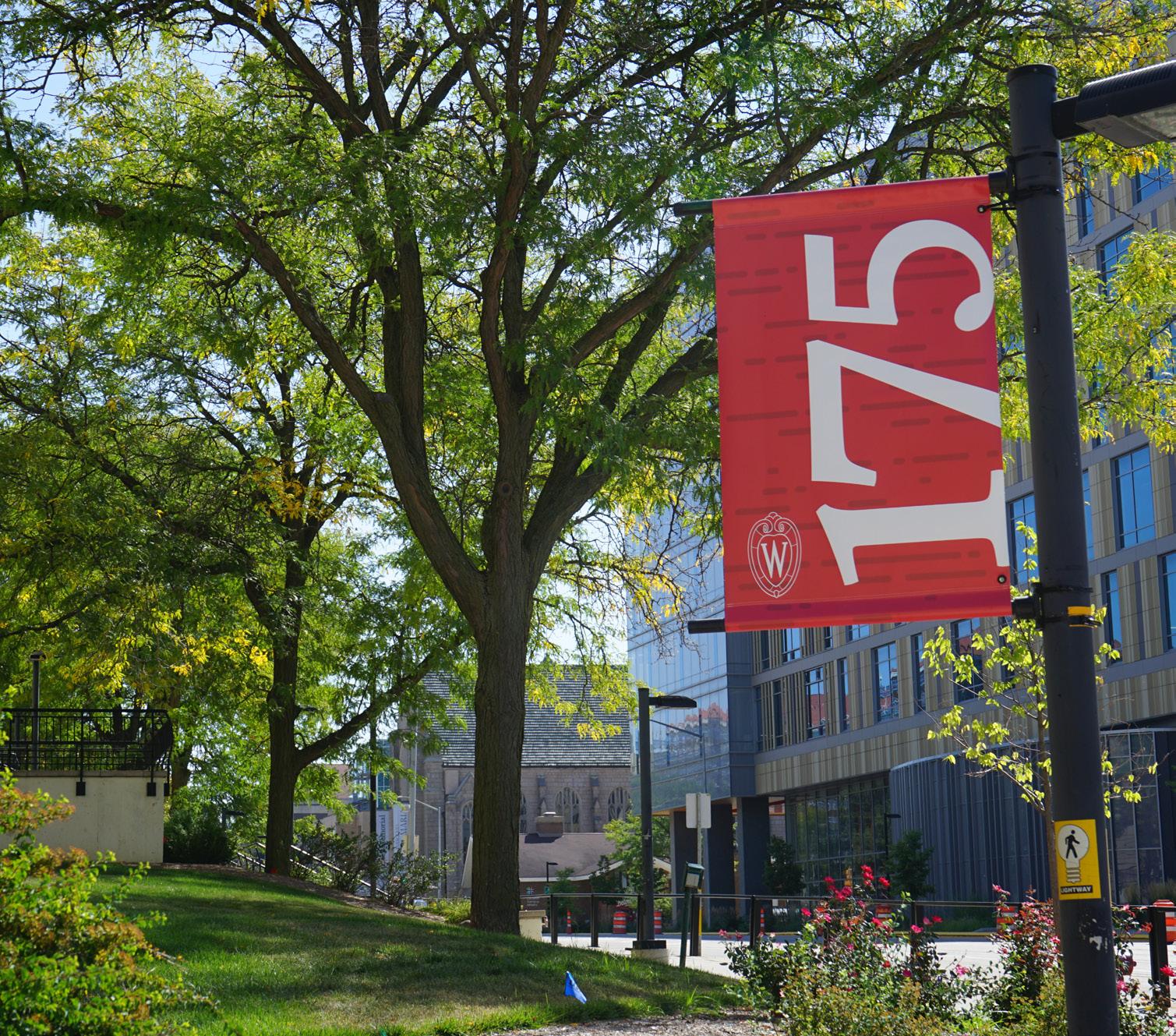
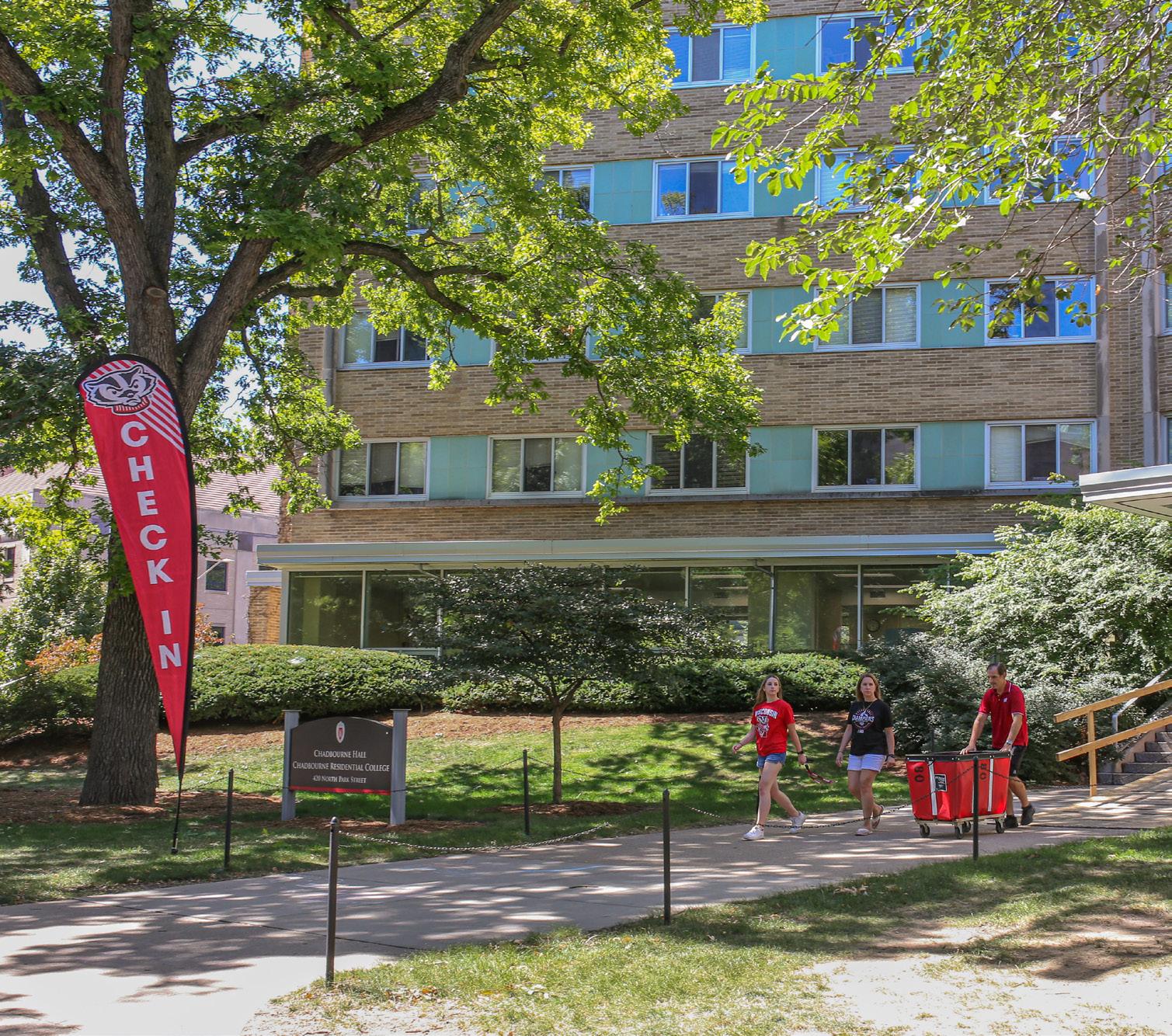
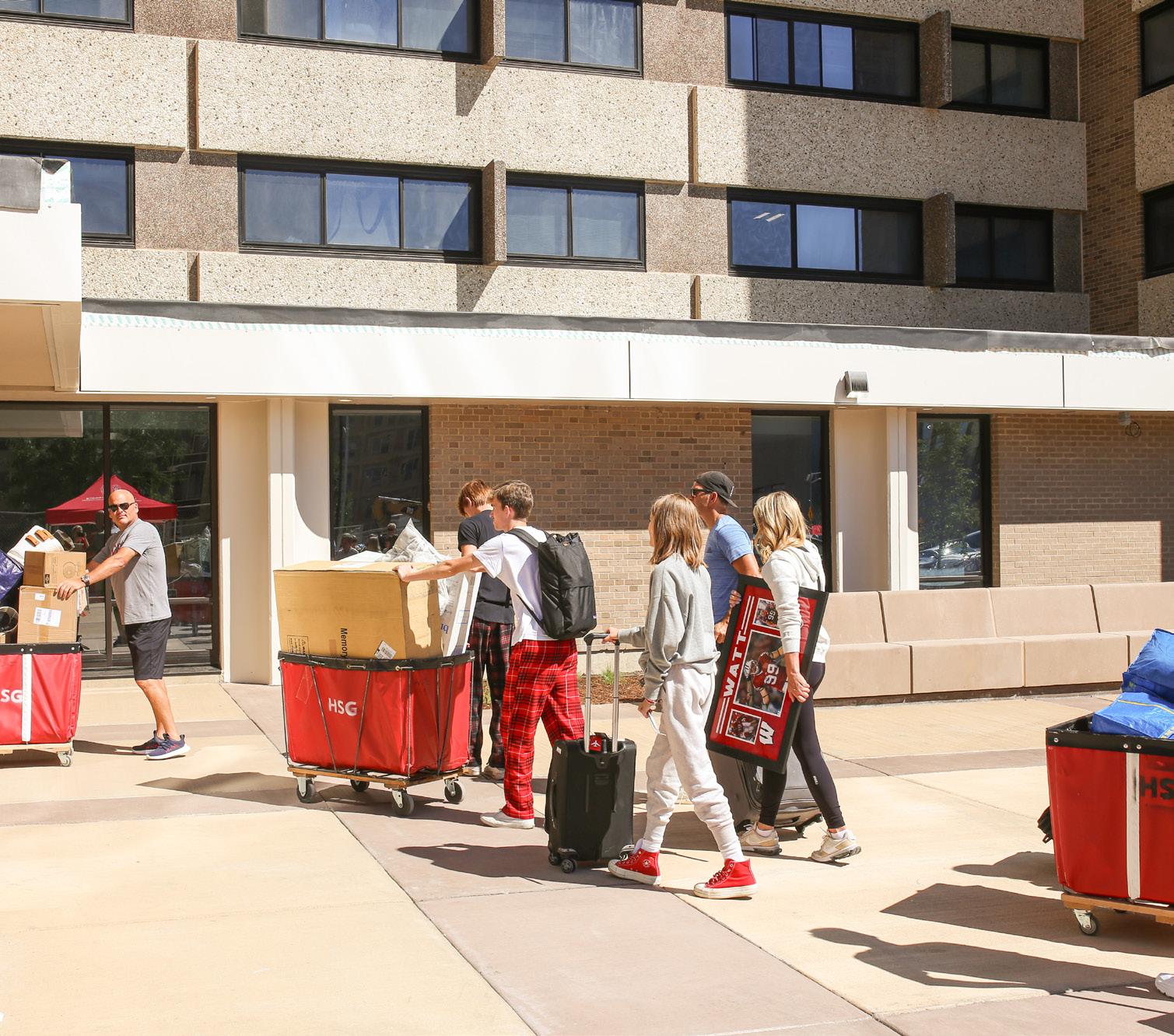
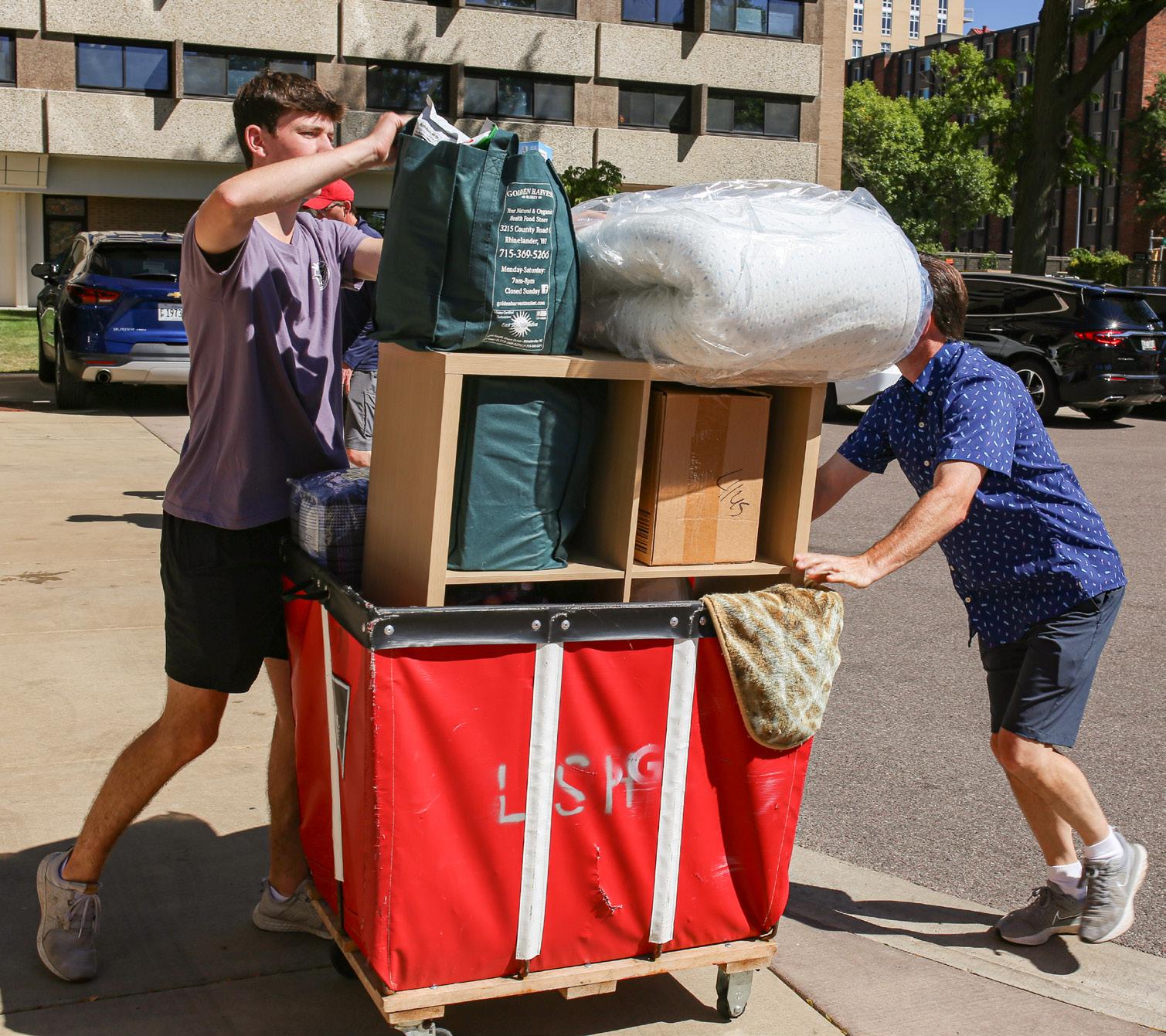
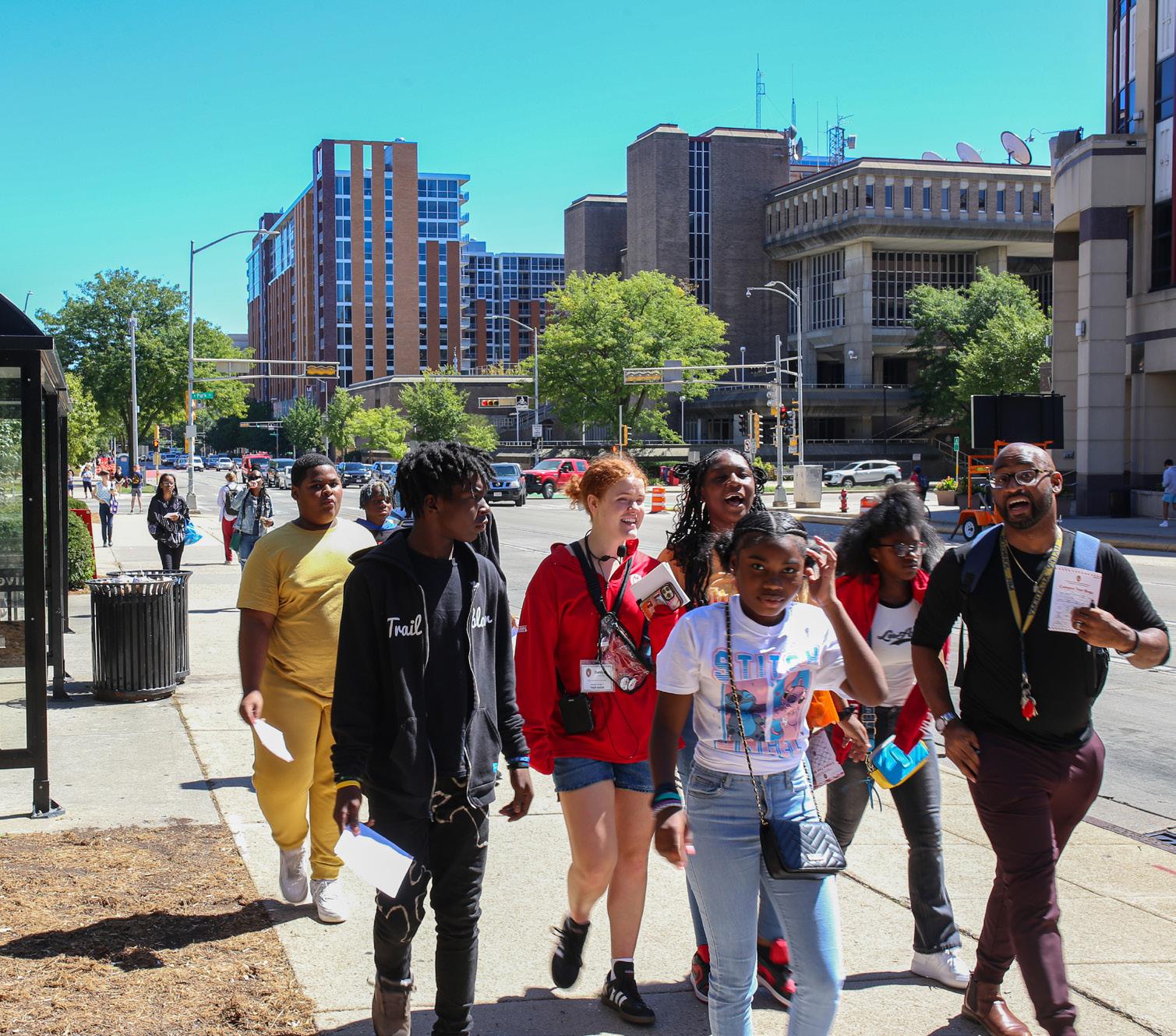
Welcome Back Issue 2023 15 Student checks in with UW Housing employees on move-in day at Witte Residence Hall. snapper’s row CORA SPYCHALLA/THE DAILY CARDINAL dailycardinal.com l Student utilizes a moving cart to complete move-in at Chadbourne Residence Hall. CORA SPYCHALLA/THE DAILY CARDINAL CORA SPYCHALLA/THE DAILY CARDINAL Families wait in a crowded line to begin the move-in process at Witte Residence Hall. CORA SPYCHALLA/THE DAILY CARDINAL A student and their family member push a loaded moving cart onto a busy sidewalk. UW-Madison's 175 flags are located all across campus to commemorate the university's anniversary. CORA SPYCHALLA/THE DAILY CARDINAL LAUREN AGUILA/THE DAILY CARDINAL A group of visitors walk with a UW Campus Tour Guide on University Avenue.




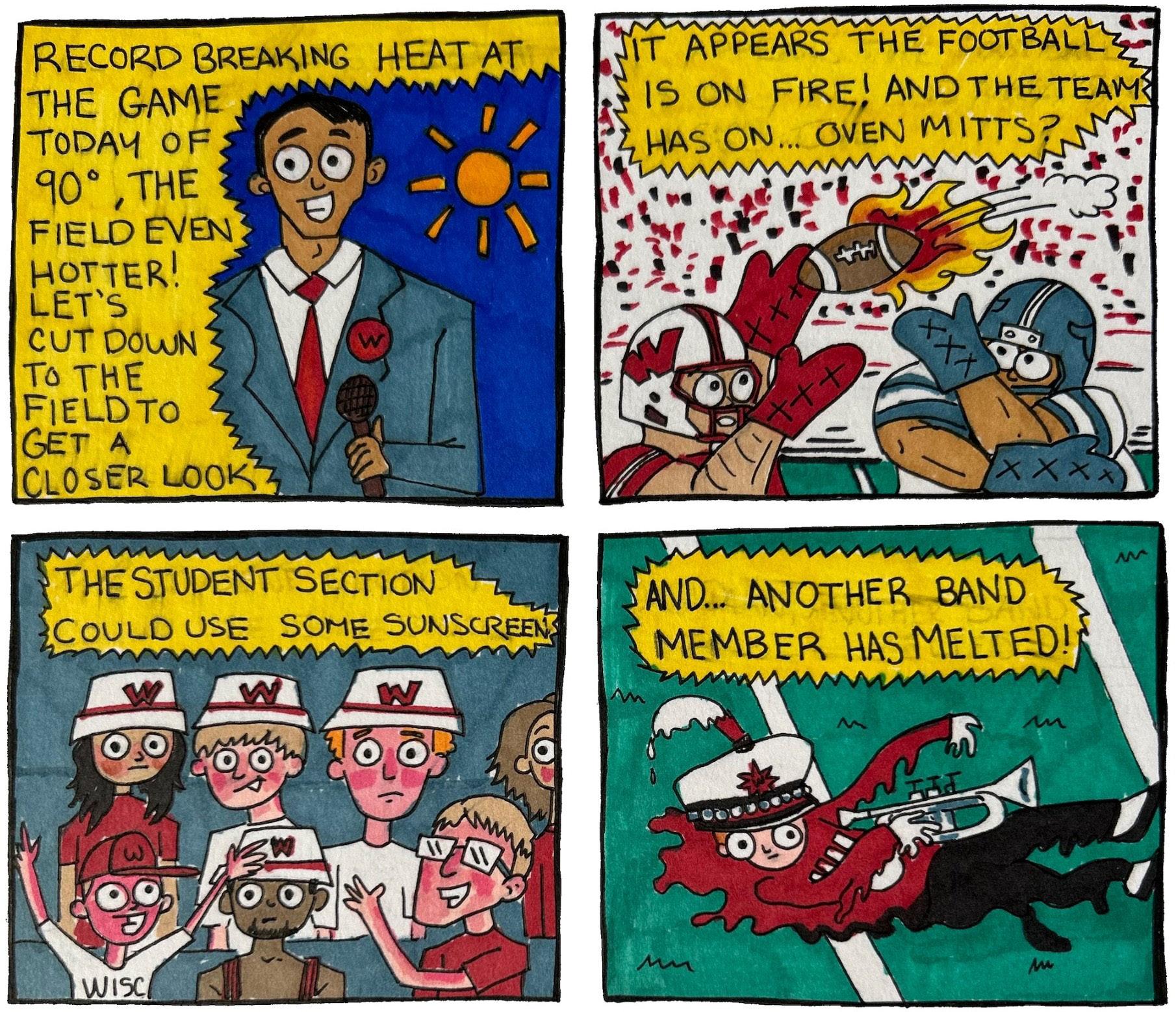
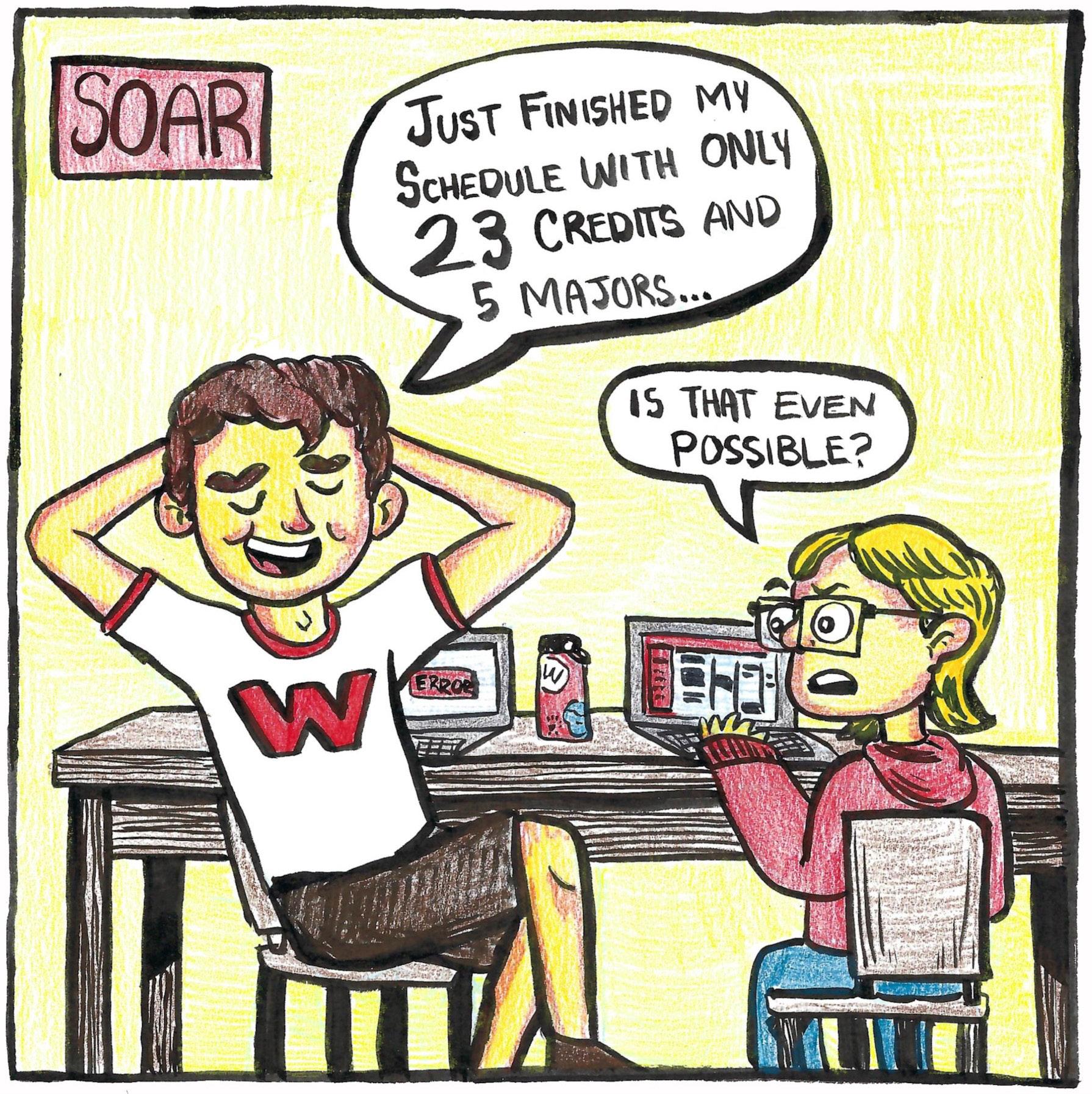



comics
Bascom Buddies
by Henry A. Moore
The Overly Ambitious Freshman by Hailey Johnson
Graphics Recruitment Ad
by Zoe Kukla Badgers v. Buffalo
by Hailey Johnson
Badgers
dailycardinal.com 16 Welcome Back Issue 2023 l
by River Kratochvil














 By Grant Matheny STAFF WRITER
By Grant Matheny STAFF WRITER




 By Dylan Goldman STAFF WRITER
By Dylan Goldman STAFF WRITER



 By Graham Brown OPINION EDITOR
By Graham Brown OPINION EDITOR
 By Charlotte Relac OPINION EDITOR
By Charlotte Relac OPINION EDITOR




 By Morgan McCormack STAFF
By Morgan McCormack STAFF















